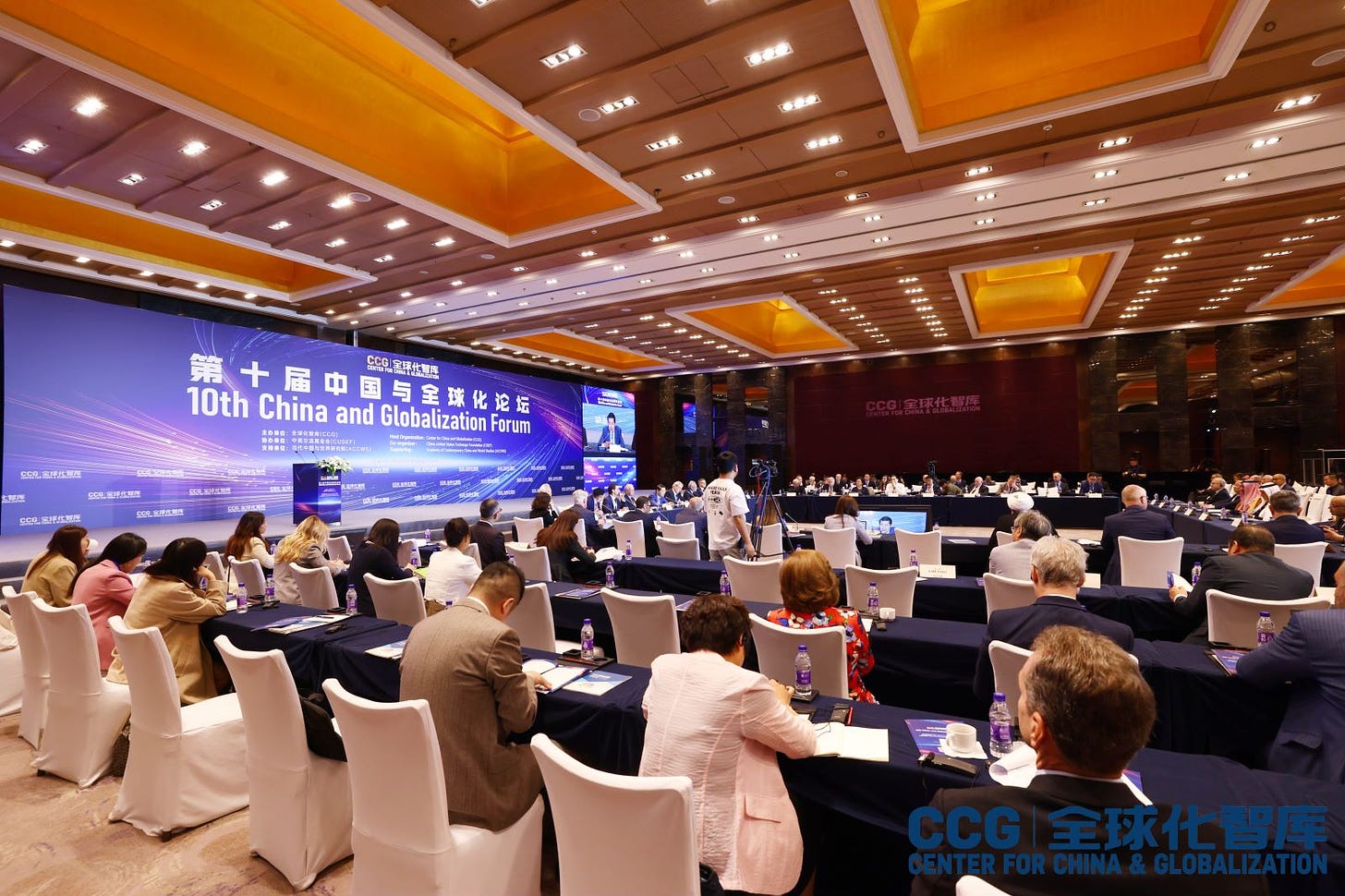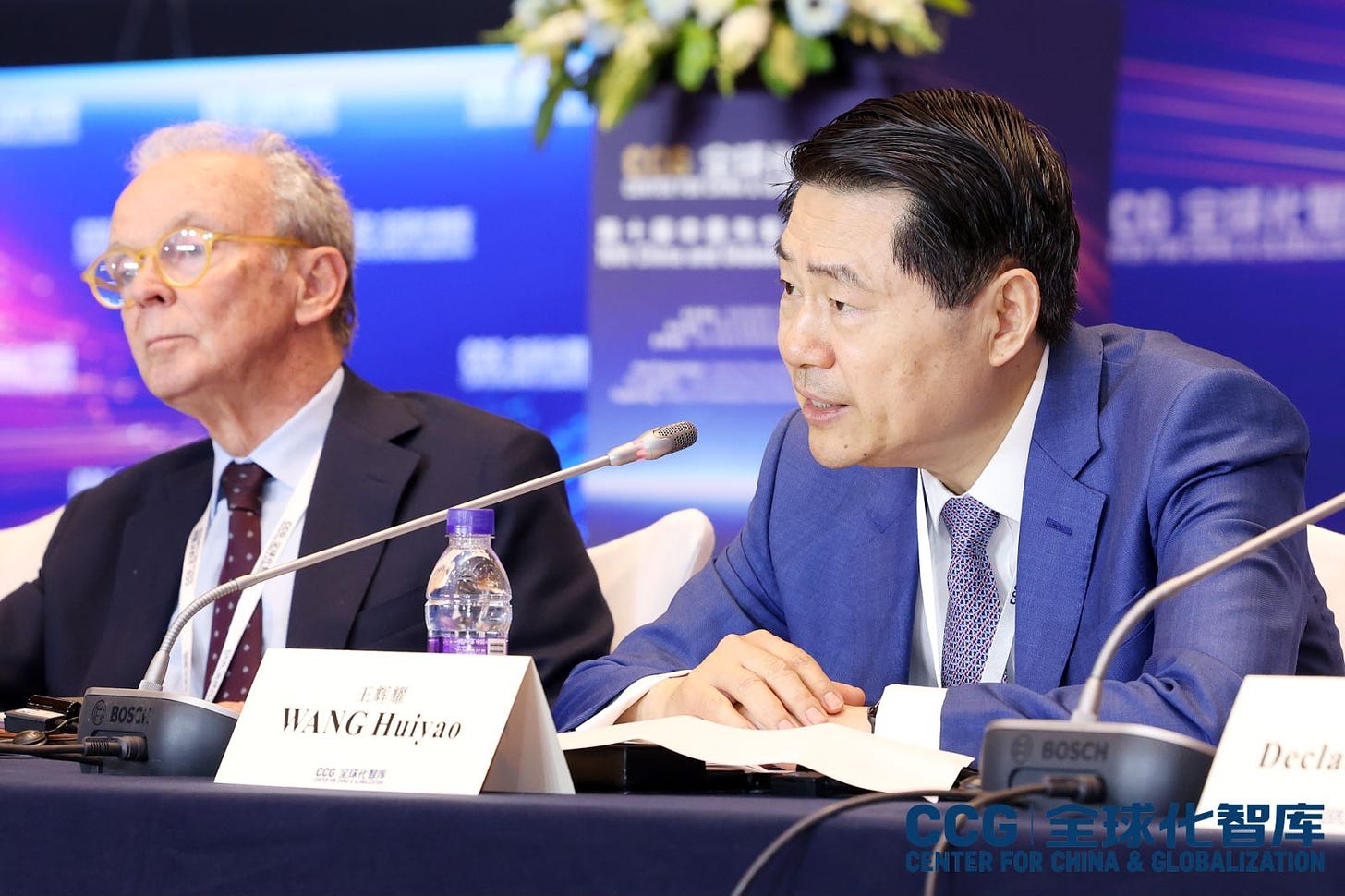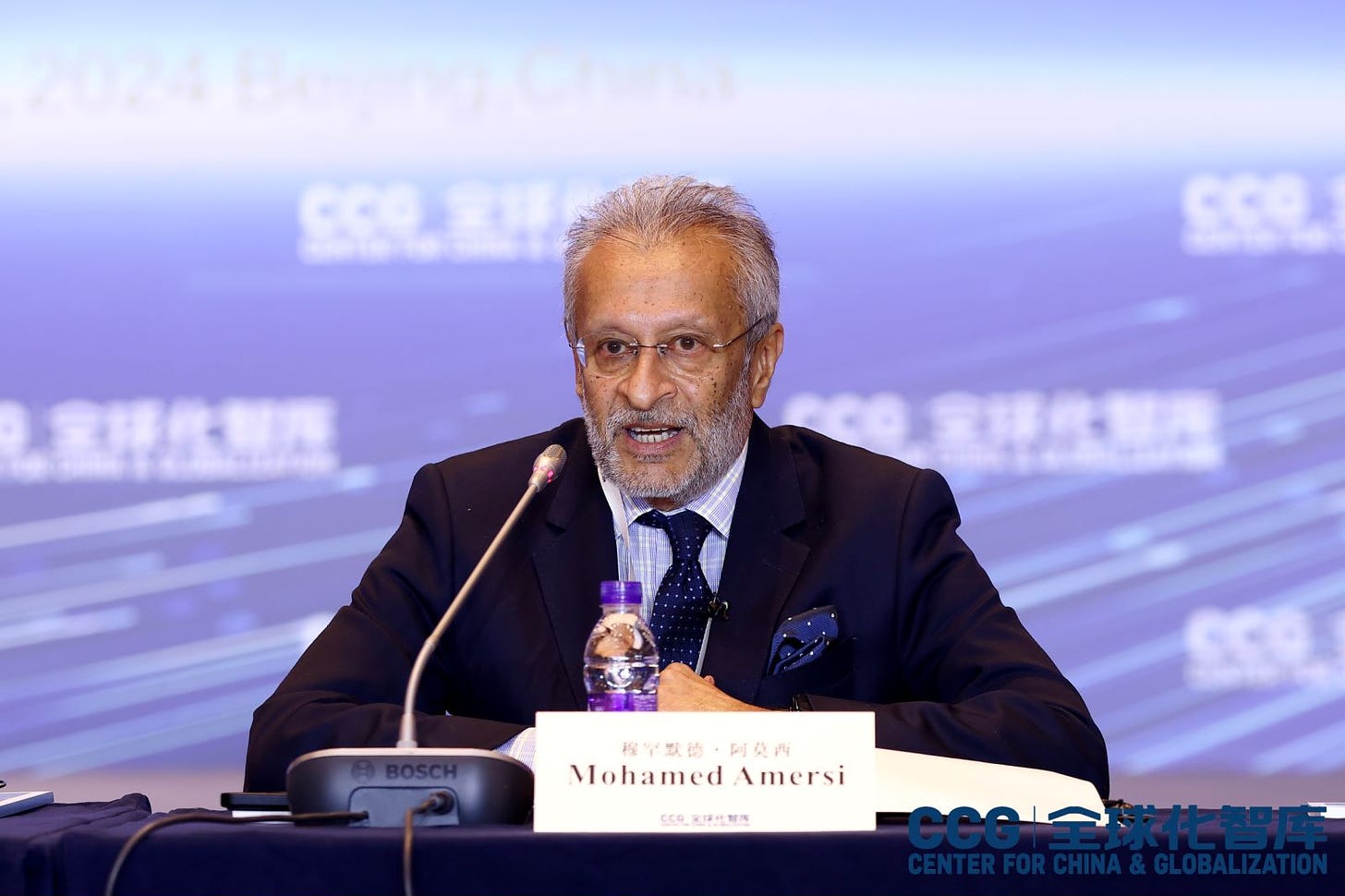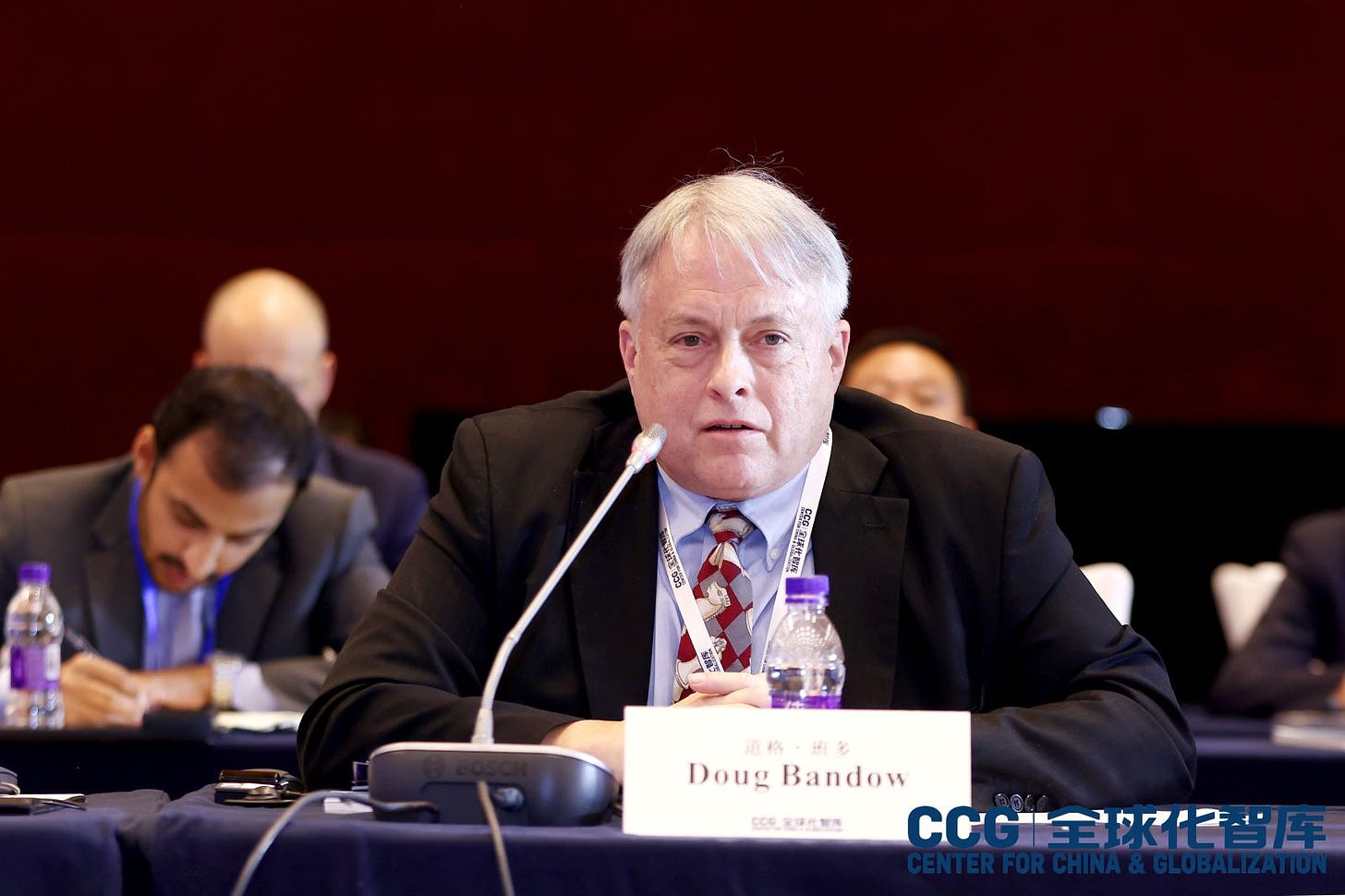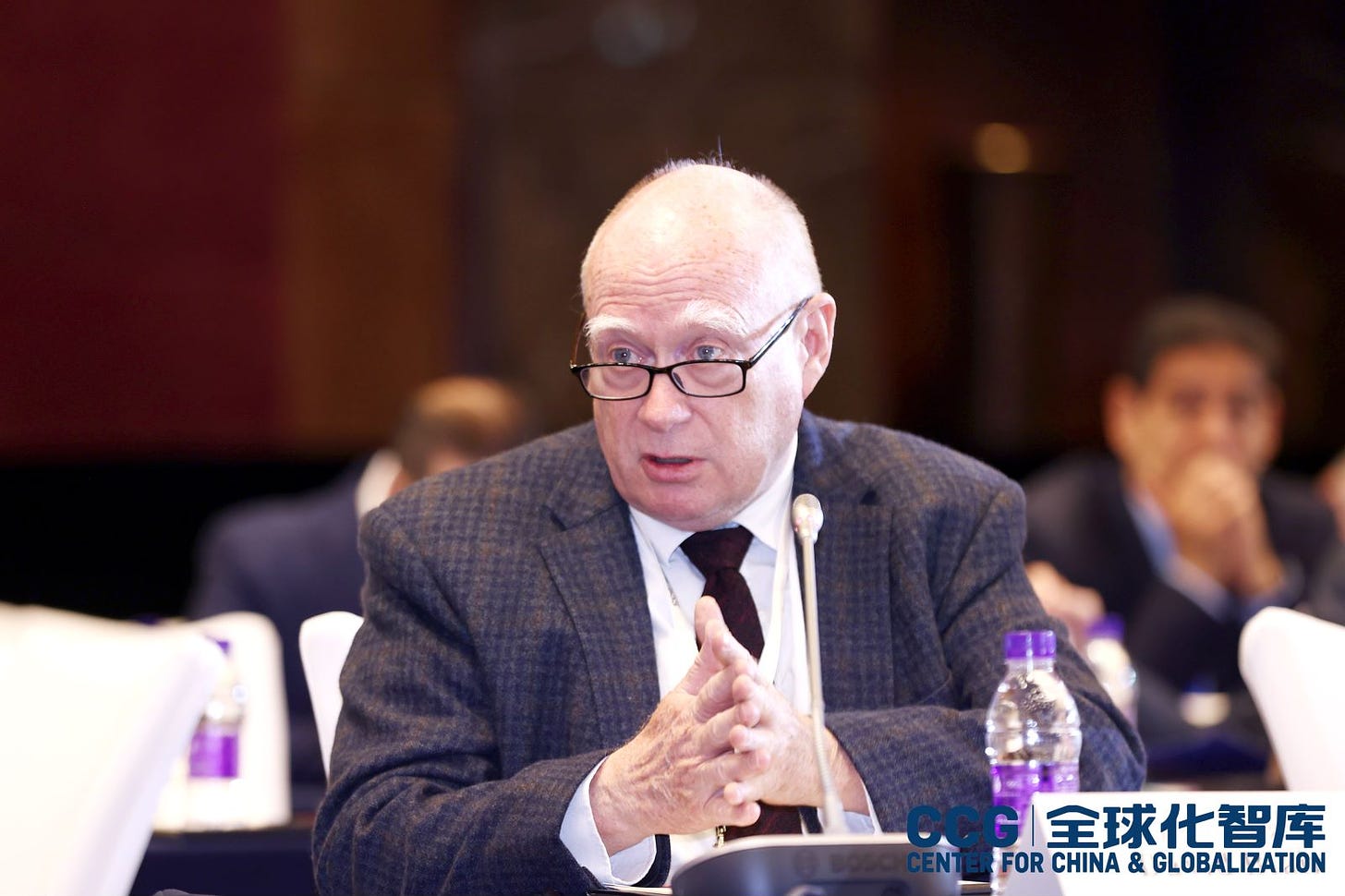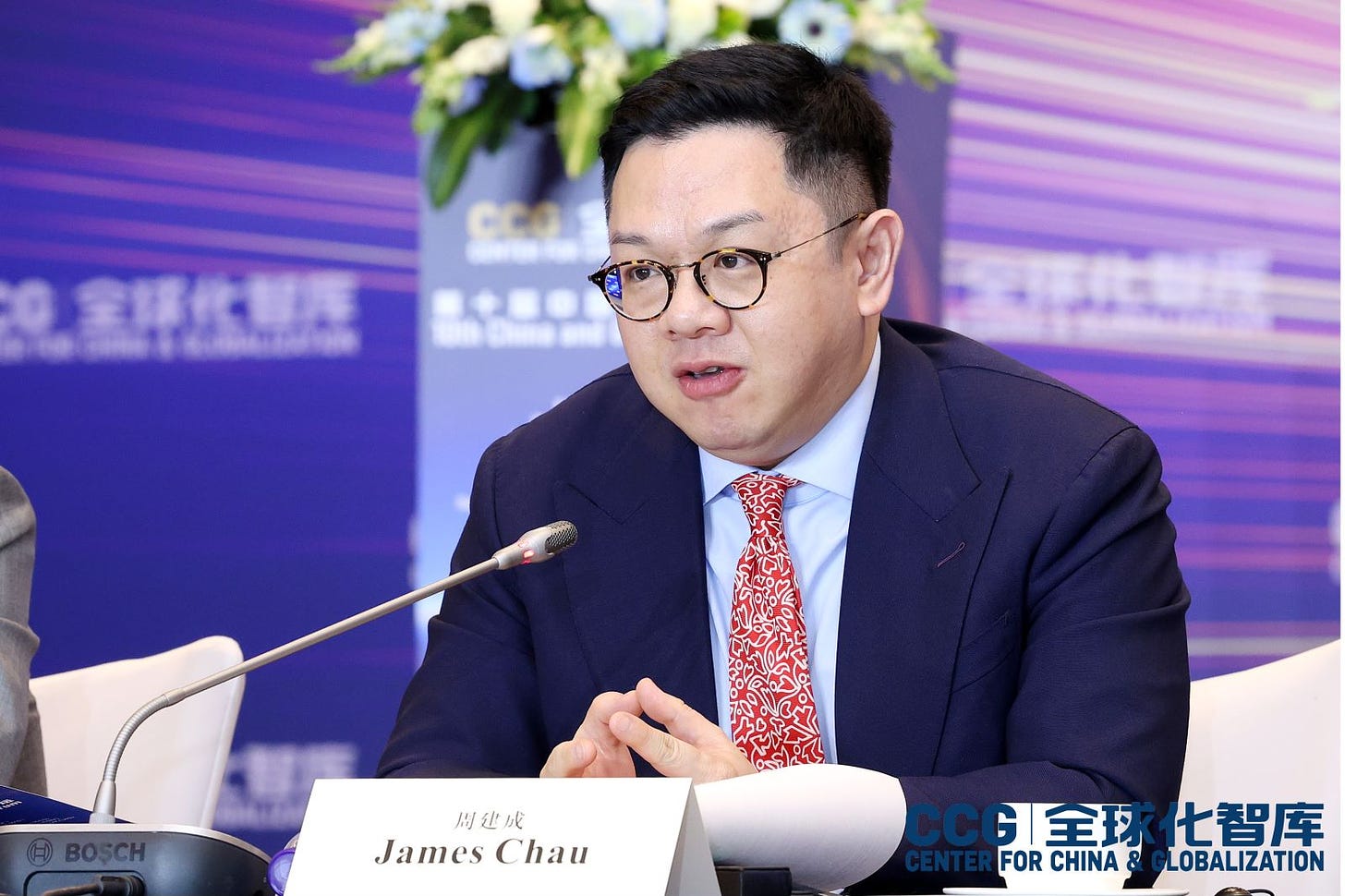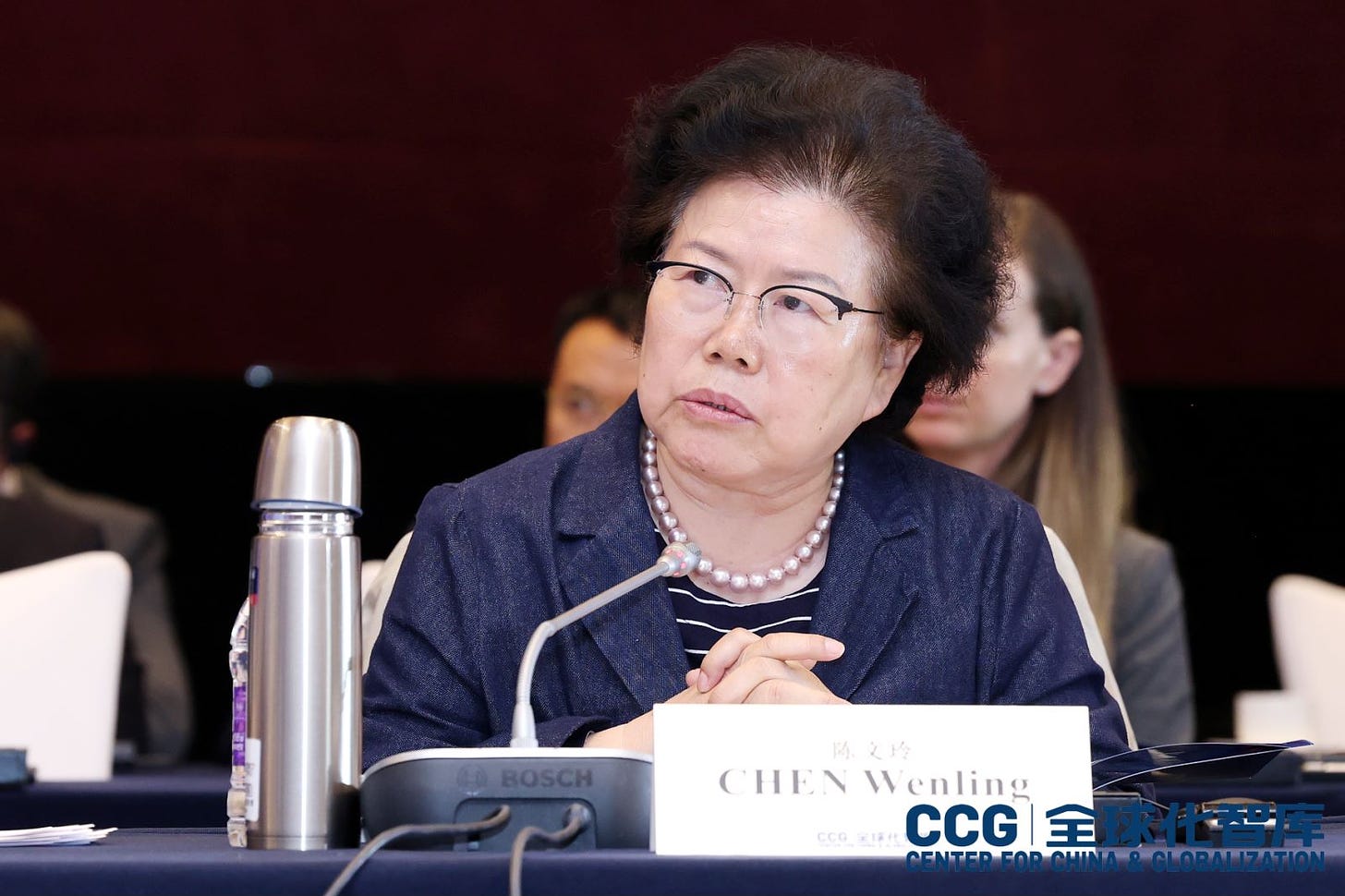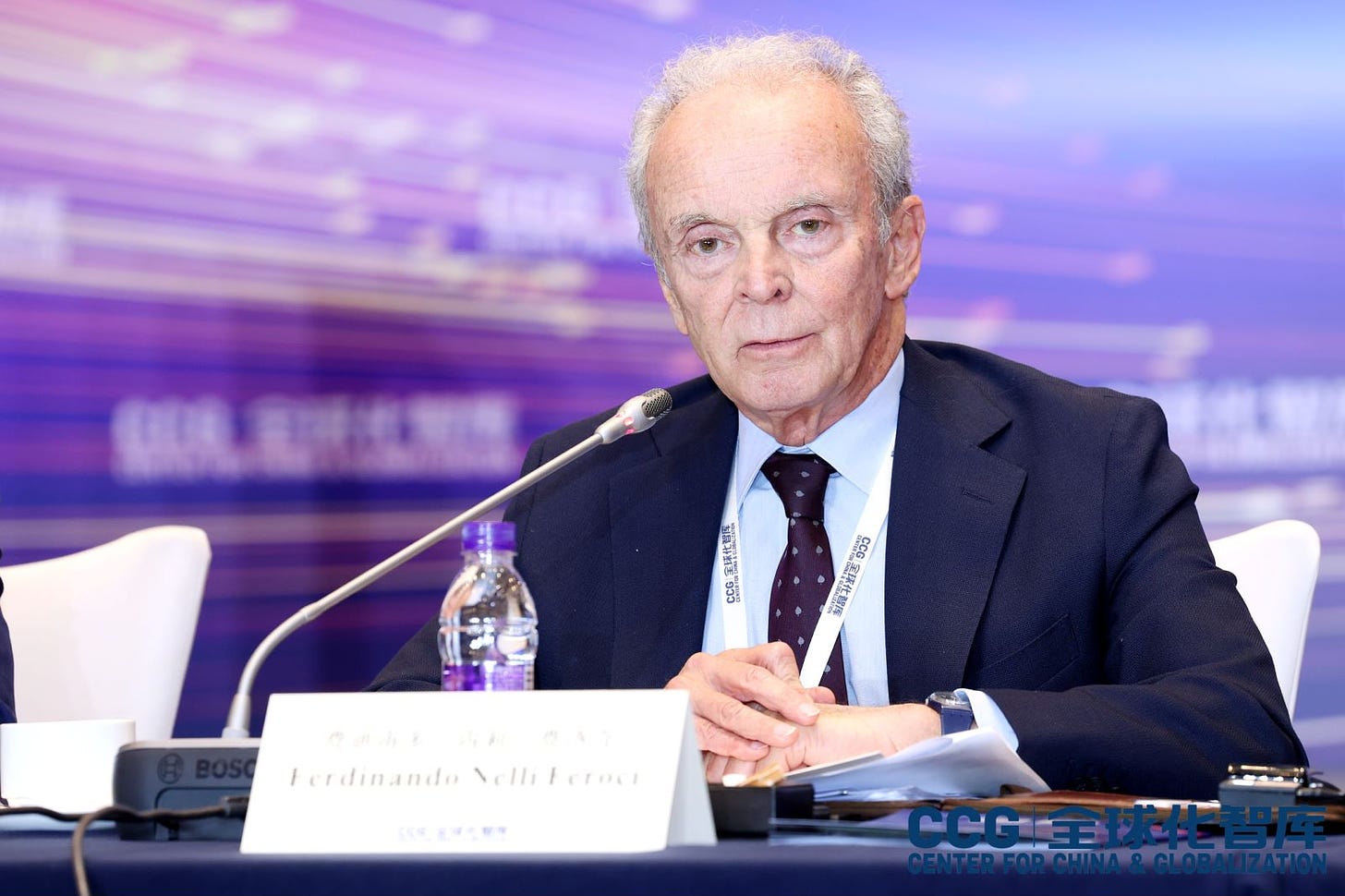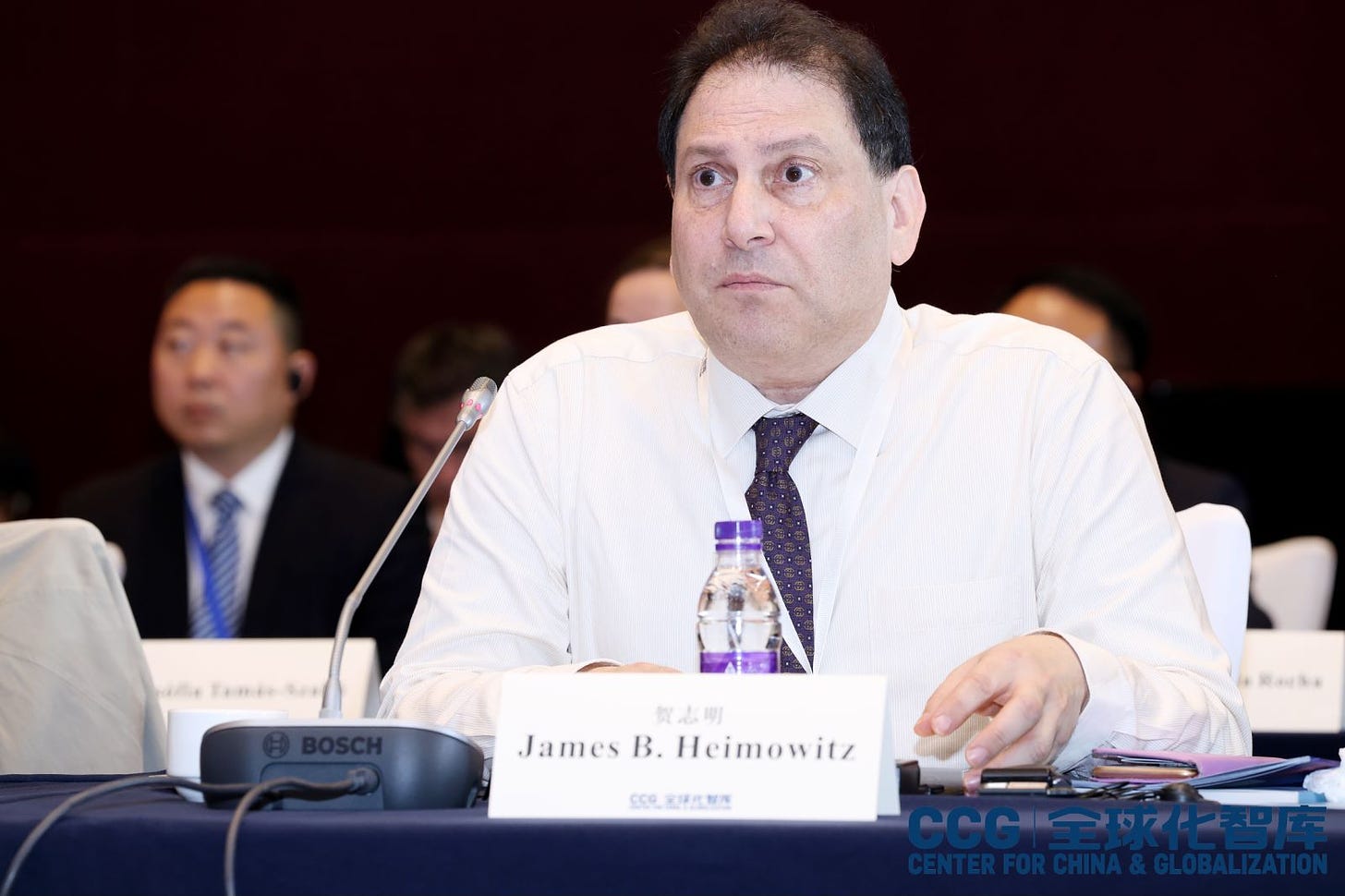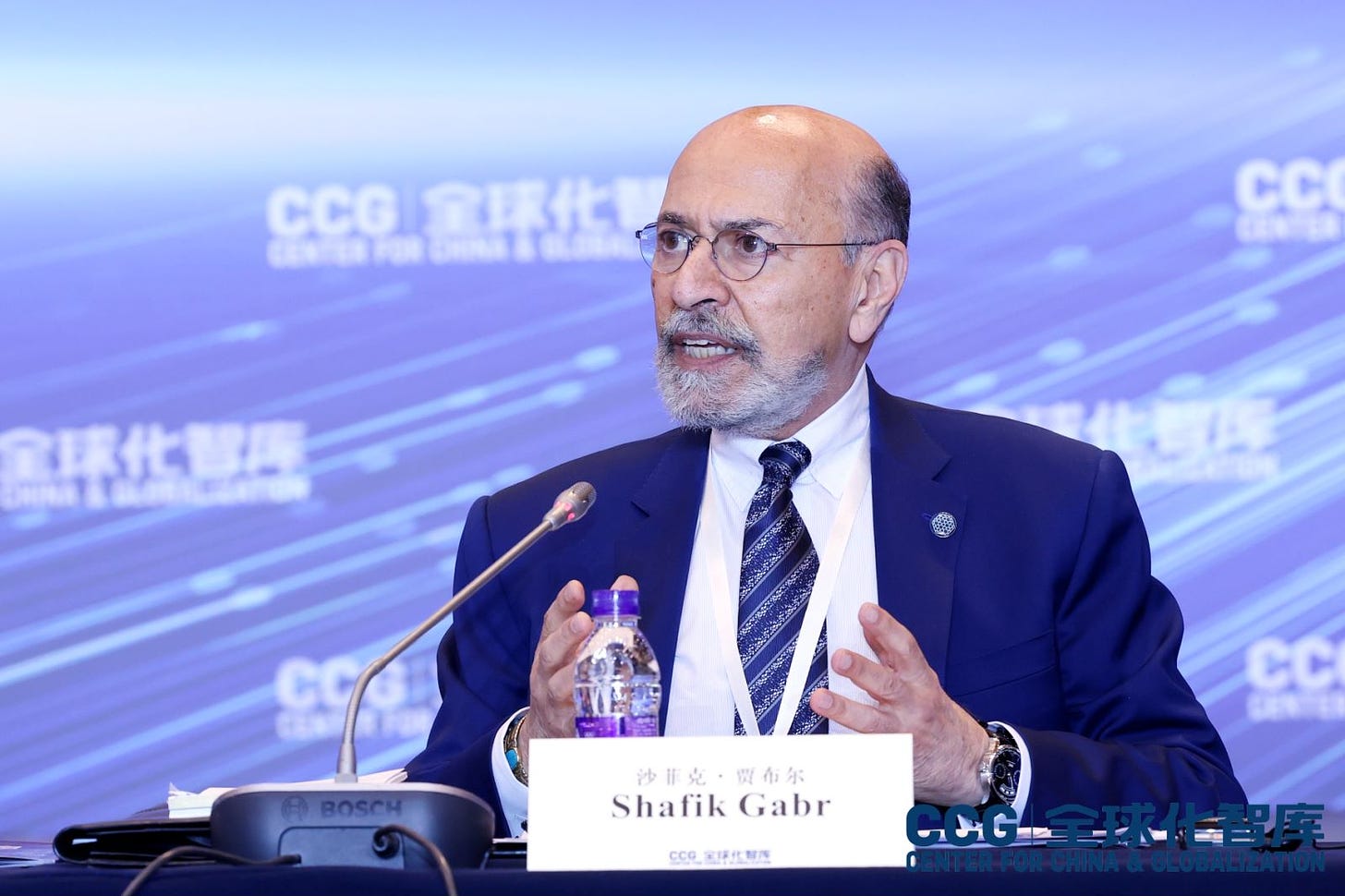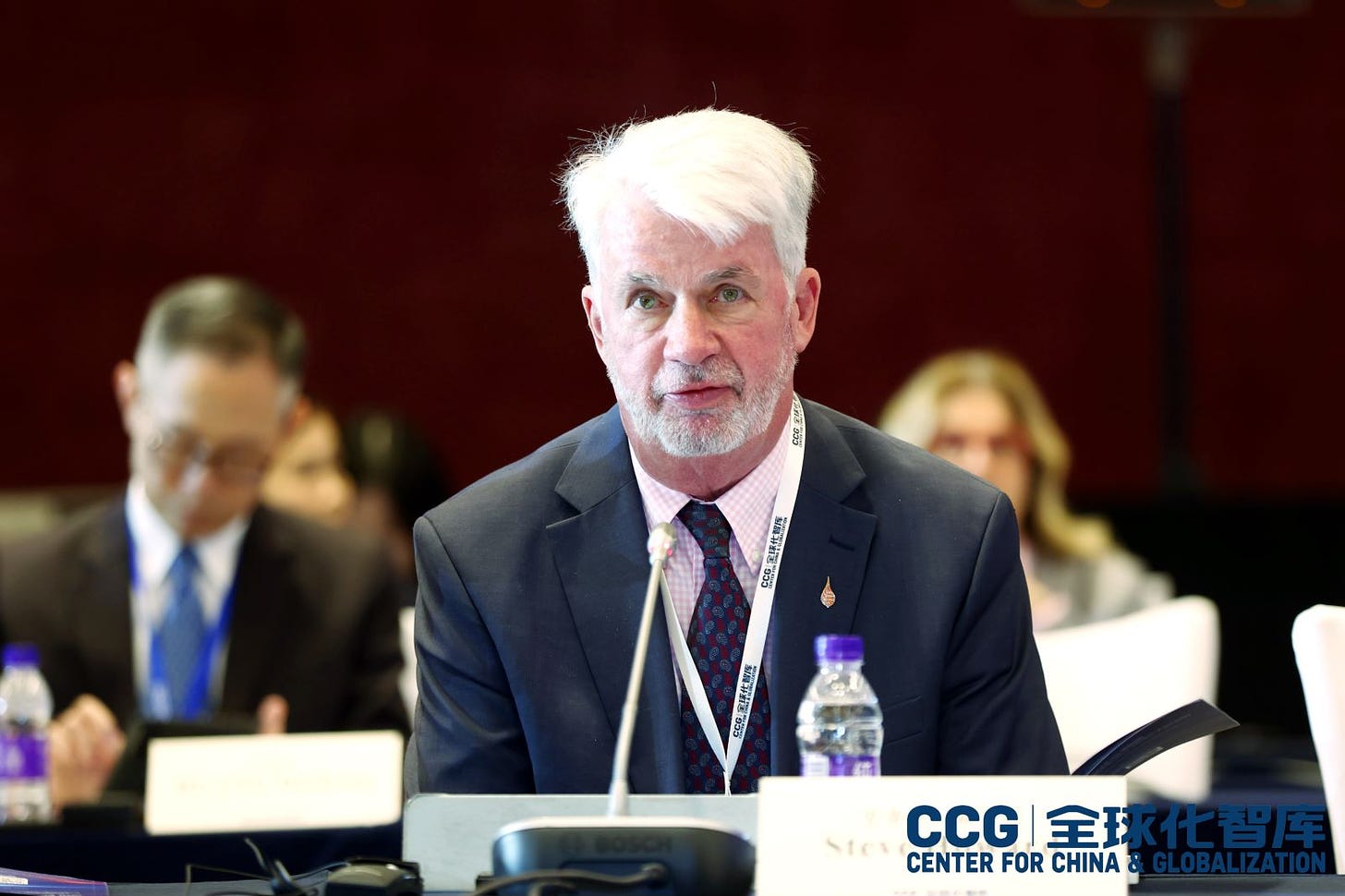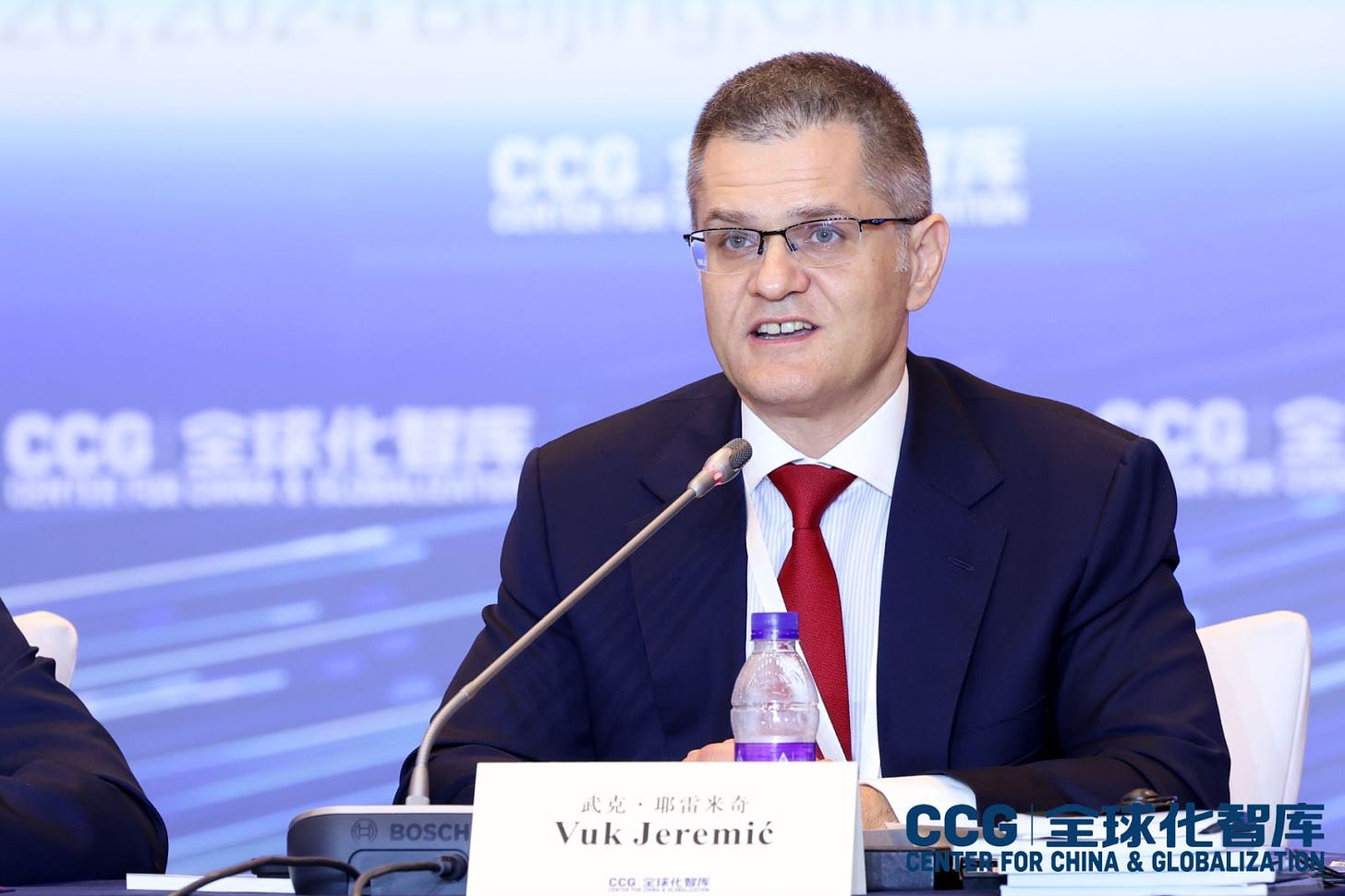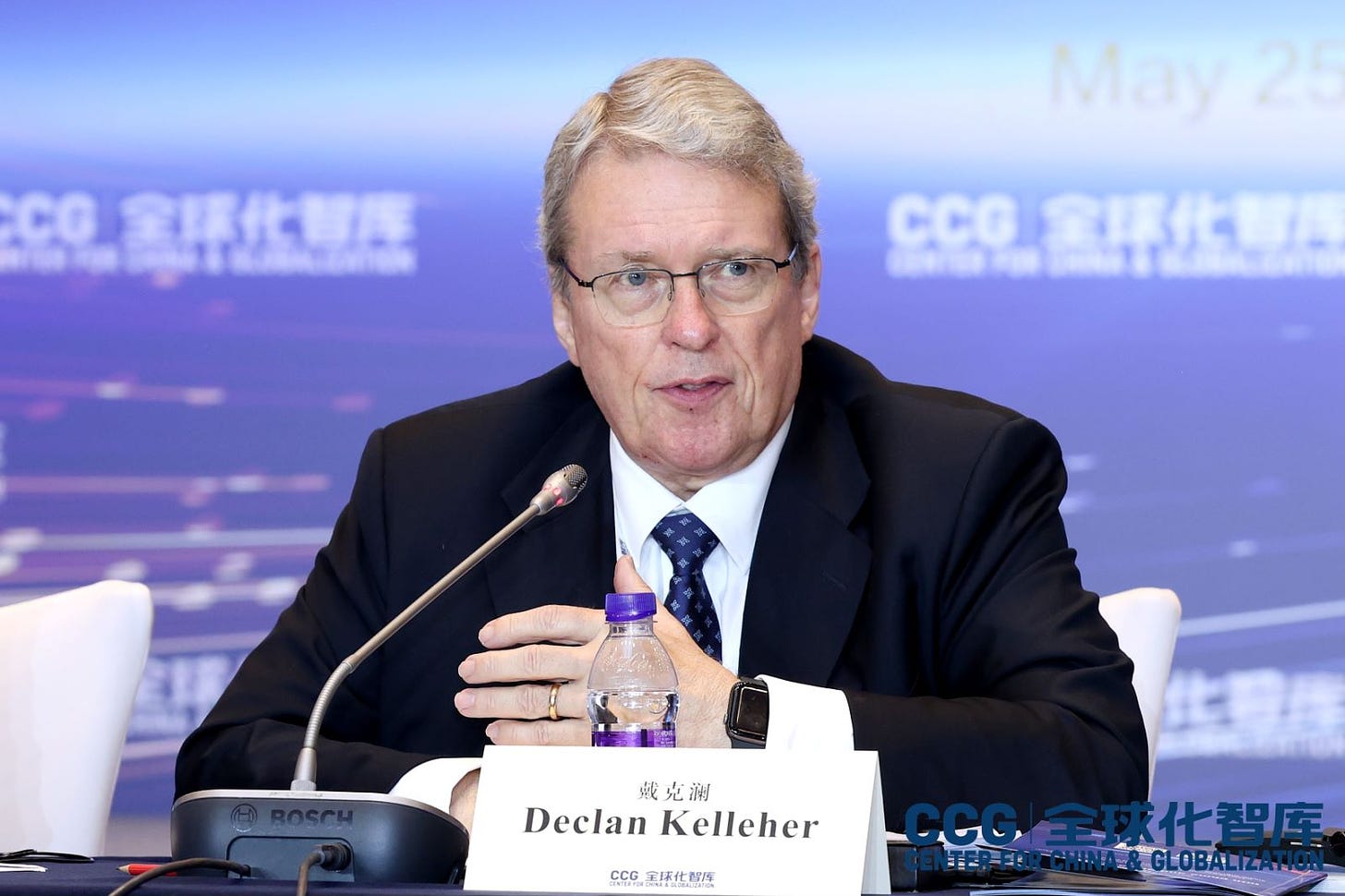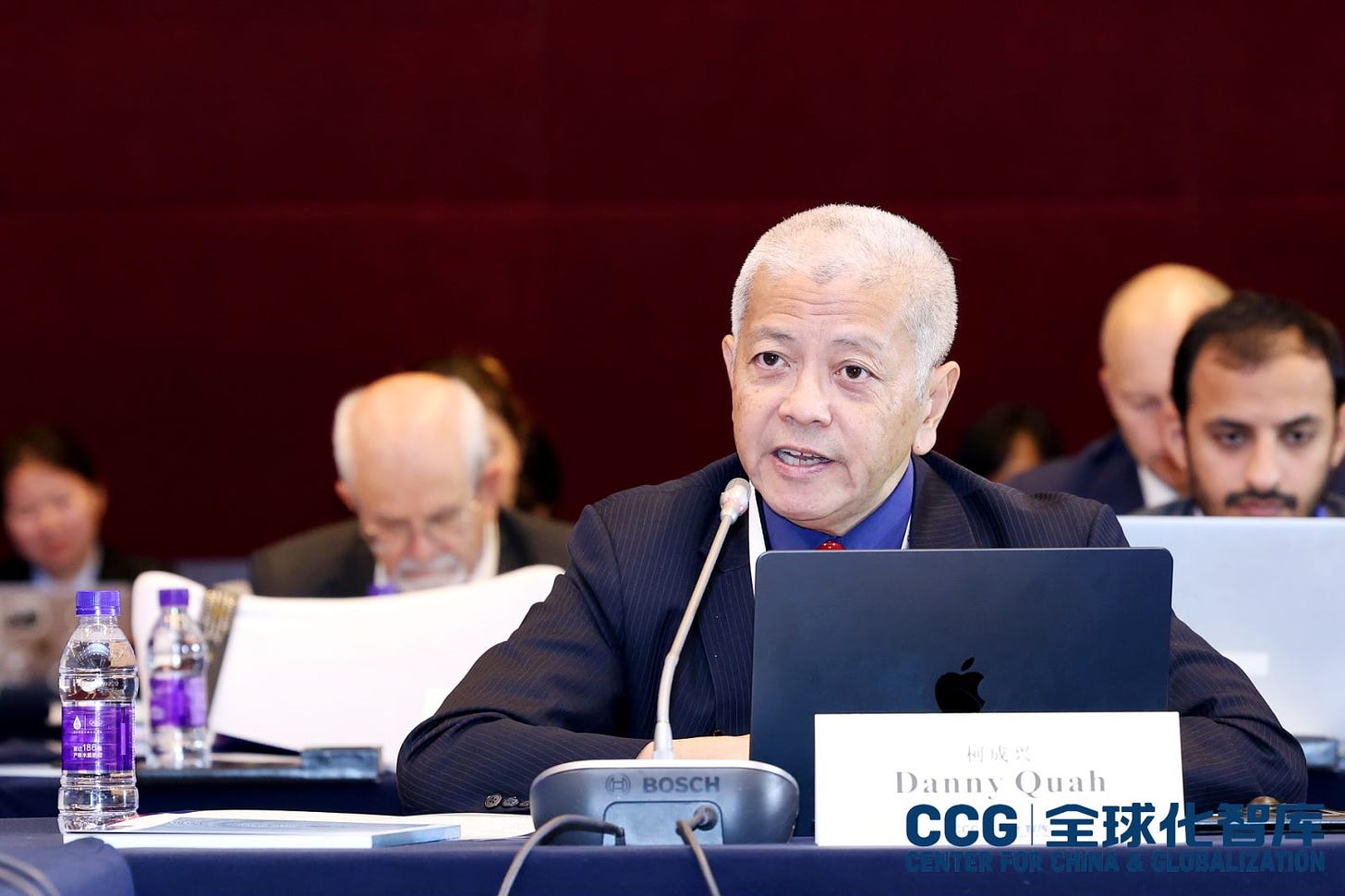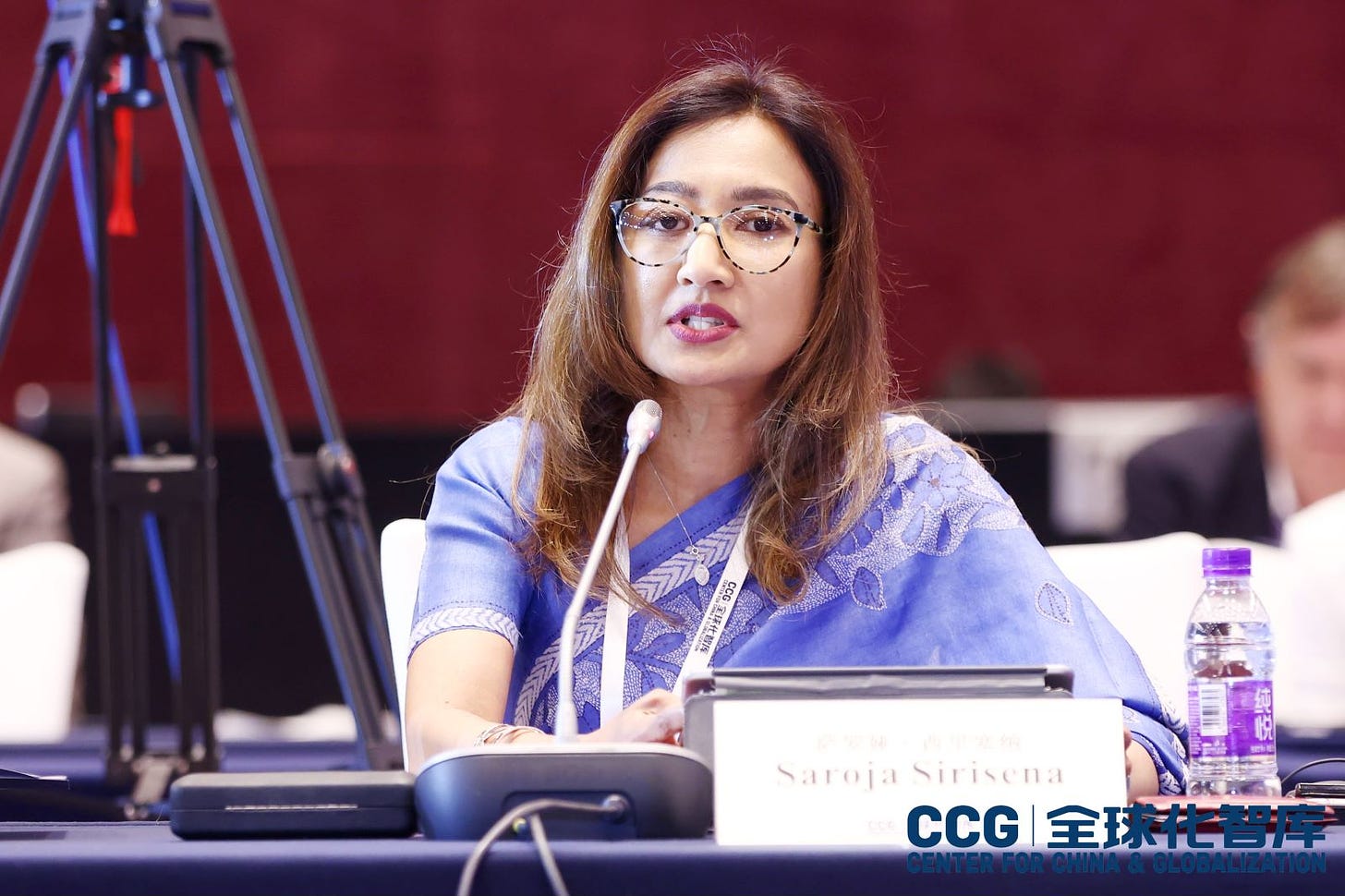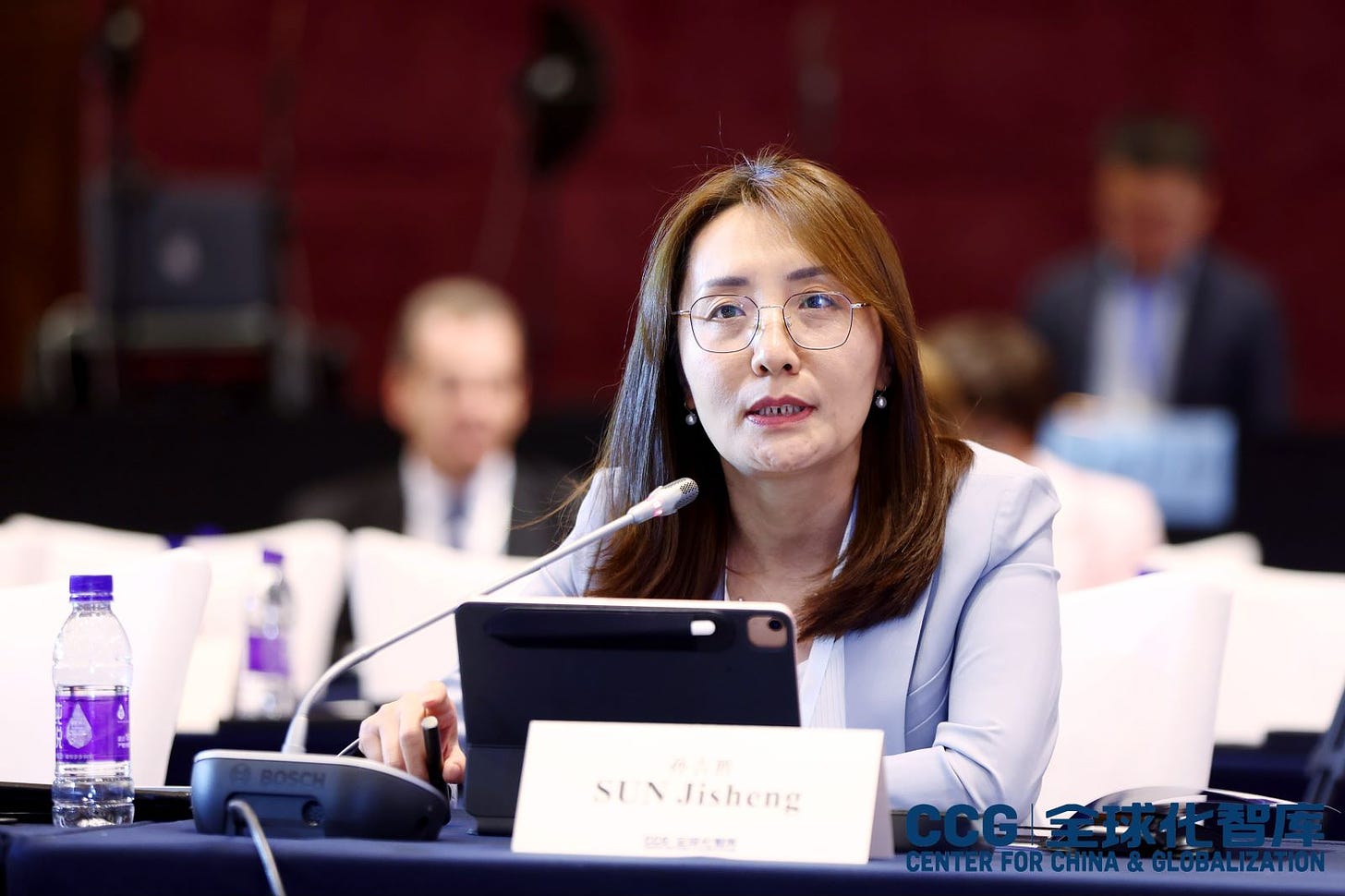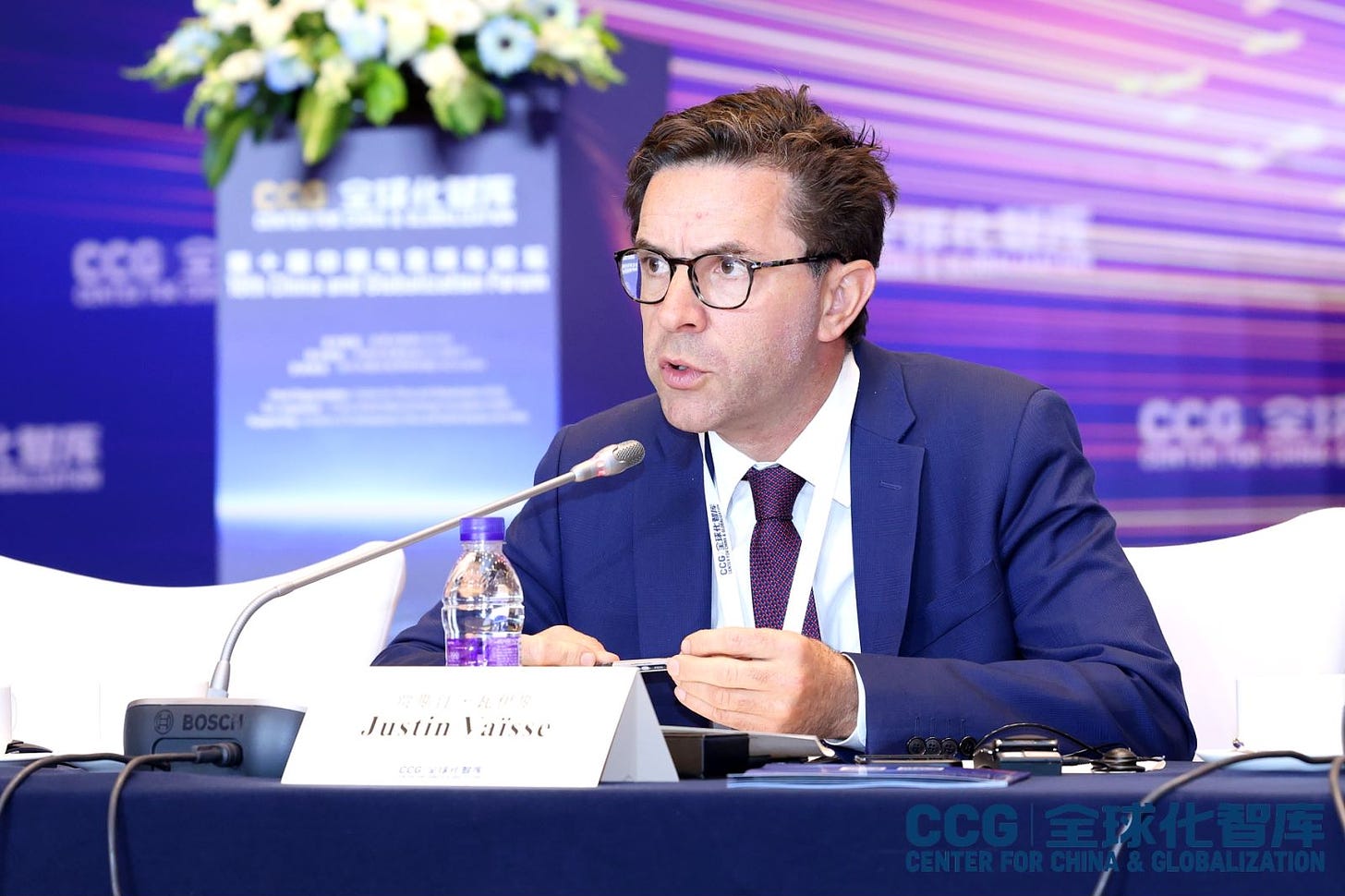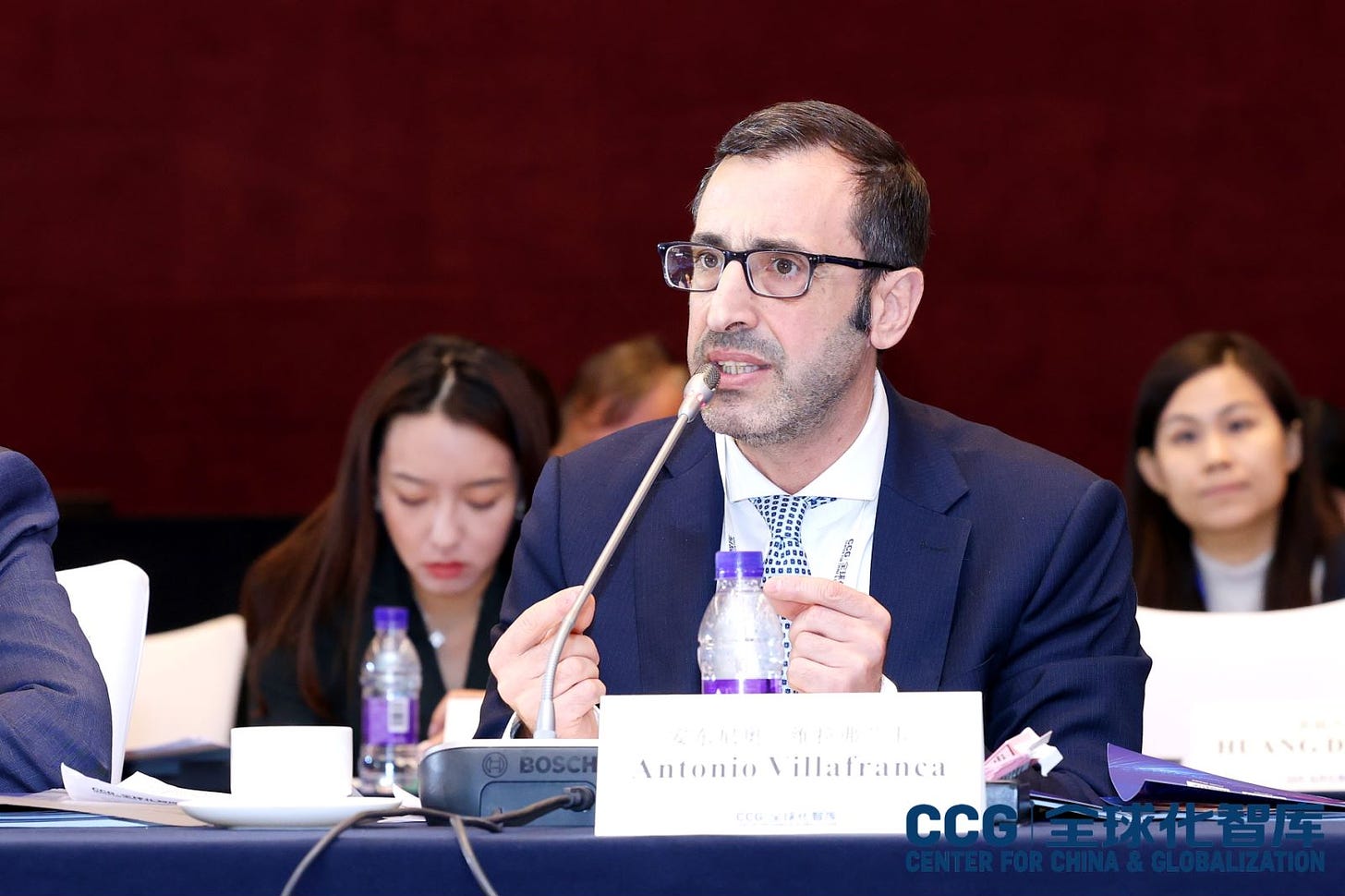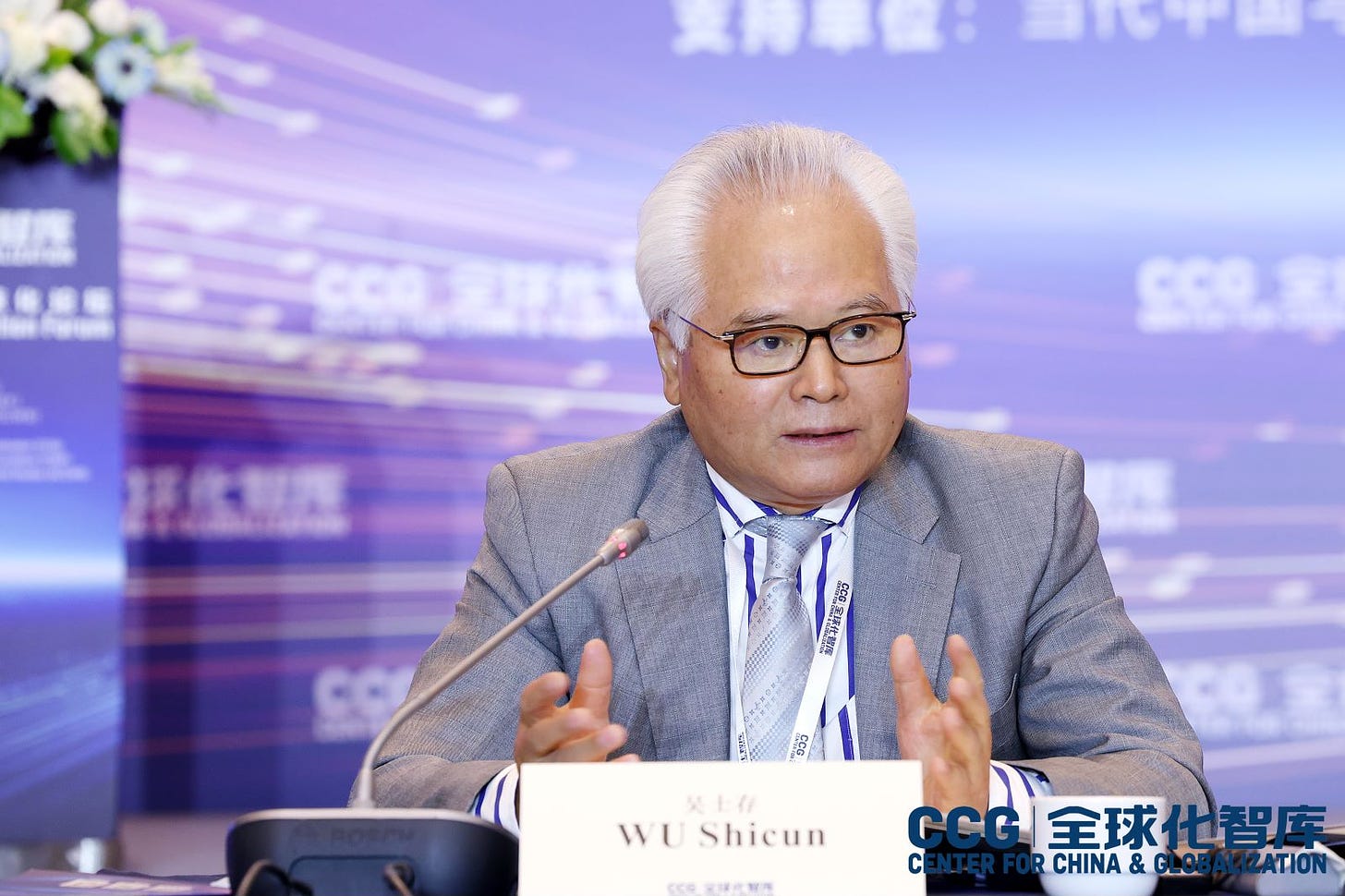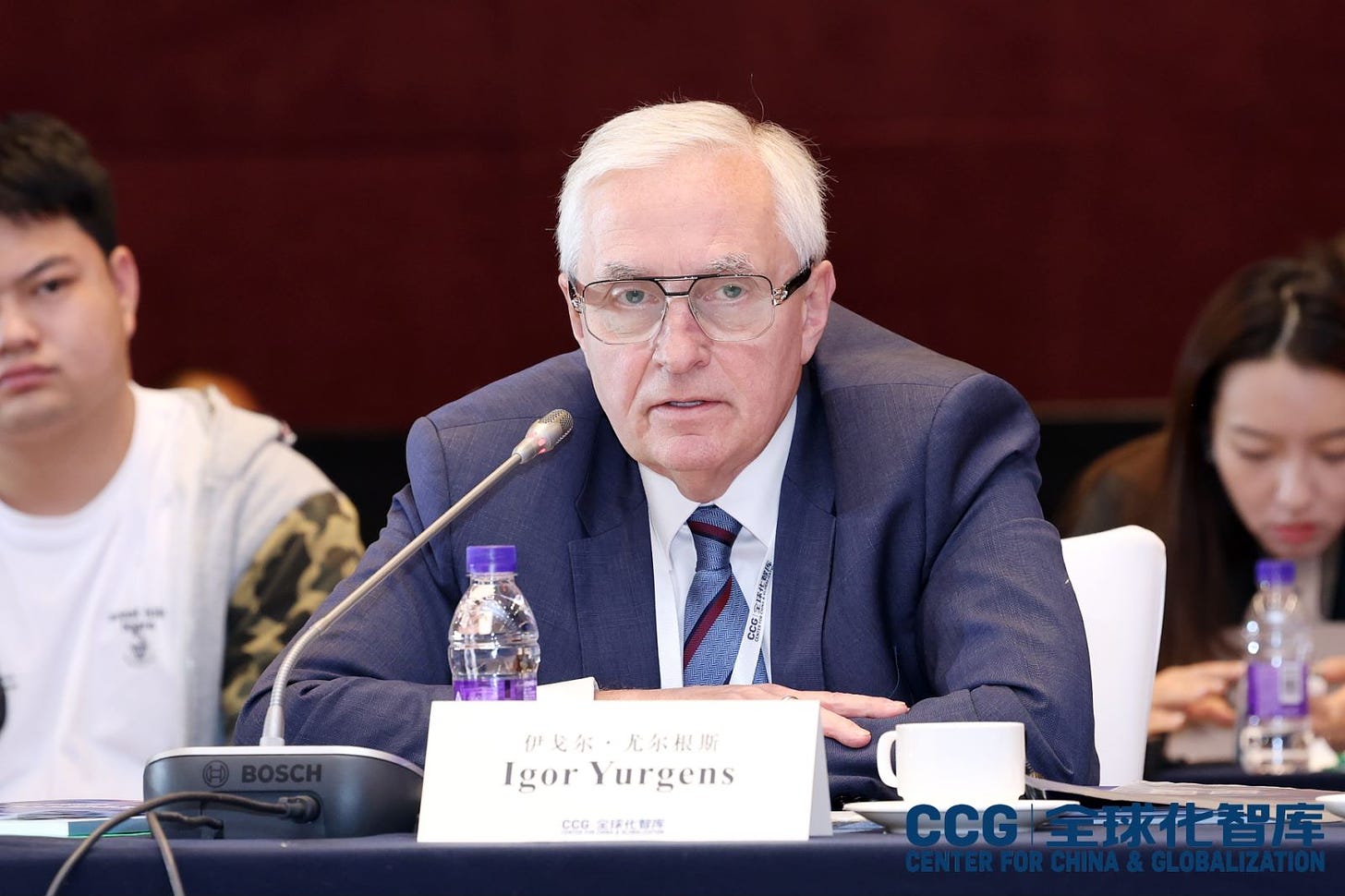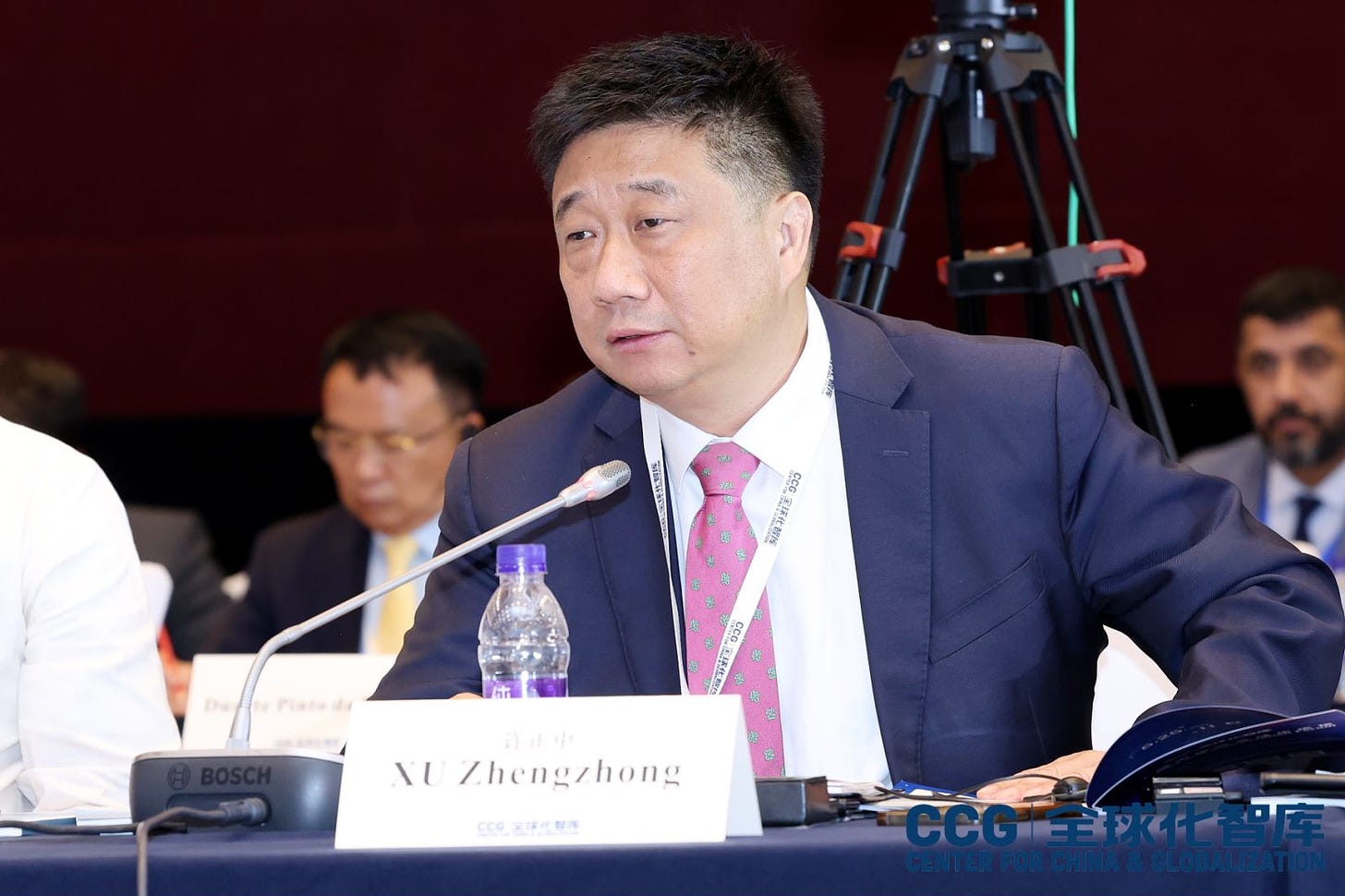Transcript of the opening roundtable of the 10th China and Globalization Forum
Rethinking globalization and global governance: Silver linings in the dark clouds.
On May 25th and 26th, 2024, the 10th China and Globalization Forum, hosted by the Center for China and Globalization (CCG), co-organized by the China-United States Exchange Foundation (CUSEF), and supported by the Academy of Contemporary China and World Studies (ACCWS), was held in Beijing.
Below is the full transcript of the opening roundtable "Rethinking globalization and global governance: Silver linings in the dark clouds." CCG has published its video recording on Chinese social media, where it remains accessible. The video recording has also been posted on CCG's YouTube channel.
The opening roundtable was chaired by Henry Huiyao Wang, Founder and President of CCG.
The speakers are, by order of appearance,
Mohamed Amersi, Founder and Chairman, Amersi Foundation
Doug Bandow, Senior Fellow, CATO Institute
David Blair, Vice President, CCG; Former Professor of Economics and Chair of the Economics Department, Eisenhower School of National Defense University
James Chau, President, China-United States Exchange Foundation (CUSEF); World Health Organization Goodwill Ambassador
CHEN Wenling, Chief Economist, China Center for International Economic Exchange (CCIEE); CCG Academic Council Member
Ferdinando Nelli Feroci, President, Istituto Affari Internazionali (IAI); former Permanent Representative of Italy to the European Union
Shafik Gabr, Founder and Chairman, The Shafik Gabr Foundation
James B. Heimowitz, Honorary Chair, China Institute in America
Steve Howard, Secretary General, The Global Foundation
Vuk Jeremić, President, Center for International Relations and Sustainable Development (CIRSD); Former President, the United Nations General Assembly; Former Minister of Foreign Affairs of the Republic of Serbia
Declan Kelleher, Chair of Governing Board, European Policy Center (EPC); Former Irish Ambassador to China and the European Union
Danny Quah, Dean of the Lee Kuan Yew School of Public Policy, National University of Singapore
Saroja Sirisena, Former Sri Lankan High Commissioner to the United Kingdom
SUN Jisheng, Vice President, China Foreign Affairs University (CFAU)
Justin Vaïsse, Founder and Director-General, Paris Peace Forum; Former Director of Policy Planning at the French Ministry of Foreign Affairs
Antonio Villafranca, Vice President and Director of Research, Italian Institute for International Political Studies (ISPI)
WU Shicun, Founder and President, Huayang Center for Maritime Cooperation and Ocean Governance; CCG Academic Council Member
Igor Yurgens, Chairman of the Management Board, Institute of Contemporary Development
XU Zhengzhong, CCG Nonresident Senior Fellow; Deputy Dean of Institute for International Strategic Studies, National Academy of Governance (Central Party School of the Chinese Communist Party)
The following transcript is based on a recording and has not been reviewed by the speakers or their staff.
Henry Huiyao Wang, Founder and President, CCG
Once again, we are starting our first roundtable, which is a very important opening roundtable. I think it also sets the theme for our discussion of the next two days. This roundtable is "Rethinking Globalization and Global Governance: Silver Linings in the Dark Clouds." Hopefully, that is really the case. Also, after the opening this morning, we had a very good turnout again at this roundtable. We're pleased to have Prince Turki bin Faisal Al Saud joining us, but we also have ambassadors from Italy, Estonia, Jordan, and many other countries as well. The tradition of the CCG annual roundtable is that we always have ambassadors roundtable. So tomorrow morning we'll have another ambassadors' roundtable. 12 ambassadors have confirmed to participate.
I'm very pleased to have the roundtable guests gathered here today and to start this opening roundtable. It is very important that we're gonna have this discussion. I know that you are all coming from different parts of the world. It's really a multi-perspective roundtable that we're having this morning.
As we all know, as the main drivers of globalization have weakened or even gone into reverse, the world is increasingly fragmented and polarized. The sensation of crisis is not new, of course. And among the new economic conflicts of the pandemic, we're seeing the most active conflicts of any time since the end of the Second World War. Along the lines, there are issues such as geopolitical competition, digital transition, international security, and all those issues that are really important to watch out for. Also, we have an unprecedented election year throughout the world. Particularly, the U.S. presidential election in November is almost certain to be 2024's most watched event, on course to shape the future of great power competition, multilateralism, and global governance. So we must avoid ending up in ever more lose-lose situations -- that is the Munich Security Conference theme this year. We hope that we can steer out of this fragmented global order that is happening. So we have so many think tanks and bright minds at this roundtable.
As the world is locked in the ballots of 2024, the huge question mark is what we could come next for globalization, and also what we can expect of China's role in enhancing global governance.
Last year, China's global GDP expanded to 5.2% and the first quarter of 2024 is 5.3%. So hopefully, we'll continue to be an engine of the world. China's fast-going manufacturing capacity and renewable energy will have a huge impact on the fight against climate change and keep the climate change target of 1.5 ℃. Particularly, we have a lot of Middle East participants this year in our conference--the Saudi-Iranian deal brokered by Beijing also testified to China's growing role in international mediation.
So looking ahead in climate, in geopolitics, in many global efforts at peacemaking, China's relations with Europe, the EU, the U.S., and the Global South, will really be very important. Also, we need to emphasize more on global security rather than just national security. We need to work together to meet the challenges that we're facing today.
So for the roundtable, I would like to raise some questions so that we will answer them in alphabetical order. The first question is: In the context of the change in the European Parliament and the U.S. presidential election, what will be the trends and developments in the world? Also, speaking of bilateral, trilateral relations with the European Union and the United States in the years to come, how might these relations affect future globalization and what can be done for enhanced global governance?
The second question would be: As multipolarity is increasingly becoming a reality, how might the modality of global governance adapt to embrace pluralism? What role can the Global South play in bridging the geopolitical divides? For multilateral platforms such as the United Nations, the G20, the G7, the BRICS, etc., what practical measures can be proposed to enhance the inclusiveness, accountability, and effectiveness of the global governance mechanism?
The final question is: What are the proposals and ideas that we can recommend in facing the challenges in the climate and green transition, sustainable global economy, and also global security and human security, rather than national security?
That's basically the roundtable theme. You know, I'm just giving a little frame there and hopefully, we'll have a stimulated discussion. Each of us will have five minutes to share your insights, your ideas, and your knowledge. After that, we'll see if we have more time and can come back for some more exchanges. I'll do this according to this roundtable's alphabetical order. And so first, I would like to invite Mohamed Amersi, the Founder and Chairman of the Amersi Foundation to speak. Amersi, please.
Mohamed Amersi, Founder and Chairman, Amersi Foundation
Thank you very much, Henry. It's great to partner with you at this very auspicious forum. Thank you. As I said last year at this event, we are at an inflection point where the world is going through a tectonic shift, whereby we are likely to see a world in chaos and disorder before a new order is born. In this new world order, polarity will be governed most probably not by traditional superpower framing, but by multipolarity, where military polarity would rest with the United States, economic supremacy and polarity with China probably, techno supremacy with the citizens of the net, and environmental supremacy with those states that are best suited and able to mitigate climate change.
To get to this new world order, we might initially see power shifting from the global institutions that were put into place since World War II to fragmented but nonetheless more solidified and effective arrangements with an expansionist mindset. They will be offering competing visions of a new world order, but only a major reset will dictate which will prevail.
For now, it looks like the chips might just favor the globalizing South as opposed to the nationalistic North. The UN, the Security Council, and a multitude of multilateral organizations are largely important and represent an era that is long gone.
I had the privilege to discuss with my dear friend, the late Kofi Annan, reform of the Security Council membership and voting structure. And we've tabled many proposals but to no avail. In fact, I have subsequently observed that the only issue on which the P5 members of the council are united and on which there is no veto nor abstention is the security of their permanent tenure. Nobody wants to give up a right that they have.
But frankly, there are questions about the continued membership of France and the UK, both of which are still nuclear but are no longer the colonial powers that they were. And Russia is an interesting question because the Security Council membership was in the name of the Soviet Union, which has subsequently imploded, and not in the name of the Russian Federation.
Today, though, I want to highlight the emergence of a new kid on the block. I have labeled it using an acronym called CRINKS. C-R-I-N-K-S. This refers to China, Russia, Iran, and North Korea. I started to focus on CRINKS after my Prime Minister, the youthful but largely ineffective Rishi Sunak, referred to the axis of the autocratic states in a major policy speech in Poland a few weeks back. This is a very unfortunate labeling, but still a little better than the axis of evil coined by President Bush.
So what is CRINKS and how will the so-called liberal order manage CRINKS? The collaboration between the four CRINKS countries is now in full swing and has evolved significantly as a result of the Russia-Ukraine and Israel-Palestine conflicts. They have accelerated their deepening economic, military, political, and technological ties. The four powers increasingly identify common interests, match up their rhetoric, and coordinate their military and diplomatic activities. Their convergence is creating a new axis of upheaval, a development that has the potential to fundamentally alter the geopolitical landscape.
This group is not an exclusive block and certainly not an alliance. It is instead a collection of dissatisfied states converging on a shared purpose of altering the principles, rules, and institutions that underlie the prevailing international system. When these four countries cooperate, their actions have a far greater effect than the sum of their individual efforts. Working together, they have enhanced one another's military capabilities, diluted the efficacy of U.S. foreign policy tools, including sanctions, have claimed spheres of influence, and have hindered the ability of Washington and his partners to enforce global rules.
There are many in the West and the East that think that only the West has only itself to blame for all of this with the somewhat hypocritical and unprincipled approach that they have taken in relation to their foreign policy dealings. Managing these disruptive effects of their further coordination and preventing the axis from upsetting the global system will now need to be a central objective of U.S. foreign policy.
For now, the U.S. national security strategy ranks China as a higher priority than Iran, North Korea, or even Russia. That assessment is strategically sound. But when considering the threat that individual countries pose to the United States, it does not fully account for the cooperation amongst them. Driving wedges between members of CRINKS will not work anymore. U.S. policy will need to address the destabilizing effects of some of these countries acting in concert to subvert important international rules and institutions. But there I ask, is it subversion or is it a rebalancing? And how will it shake out? It is anyone's guess. I don't believe there is any globalization silver lining here anymore, only the gathering of storm clouds. Thank you very much.
Doug Bandow, Senior Fellow, CATO Institute
Thank you very much. It's great to have the opportunity to participate in this forum. We certainly are dealing with very challenging times in terms of both globalization and global governance. We see wars in conflict and potential conflicts around the world. We see economic warfare rising as an issue between countries. We see sources of instability -- elections in many countries this year that can have a dramatic impact, especially in the United States, but others as well. We also see populist impulses evident in countries around the world, including European countries and the United States.
And perhaps the greatest challenge on globalization and global governance may be the relationship between the two largest and most important countries in terms of political power and economic influence, where we see the United States and China diverging in many aspects of relations. We see them driven apart on political and security issues, but also increasingly on economic issues. Economic issues that once brought these two countries together have become another form of discord, which is causing, I think, extraordinary problems between the two.
The challenges to globalization are many. One is protectionism and economic nationalism, where we see in the United States, Europe, and elsewhere, essentially a return to the past of closing markets, of reversing cooperation, of fear of international economic relations. We see that with old products like steel. We see it with new products like electric vehicles. We also see economics becoming a security issue where economic benefits, even if admitted, are seen as secondary. And we see pressures for decoupling and for supply chains changing. We see a fear of foreign domination of industries.
Finally, we see an increasing willingness to use economics as a form of warfare. Where we see economic sanctions, we see attempts to control the commanding heights of industries and technology. We see both subsidies and sanctions having an impact on important markets.
There are challenges in global governance as well. We see an expanding multiparty diverse world with the rise of countries like the PRC, India, Indonesia, Nigeria, Brazil, and many others, which are insisting on having a greater influence commensurate with their role in the world. Along with that, we see the role of the Global South that is becoming more challenging to the once-dominant Western countries -- you know, countries that are increasingly important and independent and showing their willingness, whether it be the issues of Ukraine-Russia or the Middle East or others, to take a divergent path from that of the old colonial powers and dominant powers during the Cold War.
We also see the role of the West being challenged. The economic share of the West is falling. We see the international credibility of Western countries and their diplomacy being challenged. And we see greater frustration with the role, especially of the United States, using the dollar and financial controls for its own political purposes. The results are extraordinary tensions within the global system of governance.
How then do we make global governance more effective when power is decentralizing and diversifying? How do we make it more effective when we see a politicization of global development and finance? And how do we make global governance work where we see both bilateral and regional conflicts increasing and having an increasing international impact, where a conflict in Europe or in Asia will have an impact on the entire world and virtually all countries in the Global South as well as the major powers?
Globalization brought the world a period of greater prosperity than ever before to more people. But today, we see economic, political, and security concerns pushing back very strongly on this era of globalization and global governance. The question then is, what are we to do? There are unfortunately no good answers or certainly no easy answers. Forums such as this one can help us find those answers. We must work together to effectively respond to these growing challenges in both globalization and global governance while preserving the benefits that we have gained in recent years through a more globalized world. Thank you.
David Blair, Vice President, CCG; Former Professor of Economics and Chair of the Economics Department, Eisenhower School of National Defense University
I agree with the previous speakers that we're at an inflection point in history; we are at a period of turmoil; we're at a period where we are, in Xi Jinping's words, establishing a new type of great power relations. And the issue that we need to be strongly focused on is what kind of new world are we building. It could be a positive world or it could be a very negative world. So I think these next few years are gonna be crucial to the future of the world.
I think one thing that we have to accept is that the old system is done. The system following the Bretton Woods Agreement, the system of U.S. leadership through the Cold War, and then wider globalization after the end of the Cold War -- that type of system that required what Hillary Clinton called the U.S. serving as the indispensable nation, I think is no longer viable. We just have to accept that. In the U.S., quite a bit of the population accepts that and really doesn't care. And there's quite a bit that's fighting a retreating action, basically, to try to preserve that system. But I don't think preserving that system is possible going forward.
If you look back at 1992, there were great opportunities to create a new type of world, and we chose a number of steps that didn't take advantage of those opportunities. It makes me very sad to look at the possibilities of the early 90s and where we are 30 years later. At that time in Europe, we talked about Europe whole and free from Lisbon to Vladivostok. What happened to that? It's gone.
So I think the ideal is a kind of multilateral relationship. But the question is whether that's possible or are we moving to something like a new Cold War or something possibly even more traumatic and worse?
There are two main goals, two main benefits from globalization. One is economic, and the other one is establishing peace. Those are the two things we want. Unfortunately, in the United States, the era of globalization essentially coincides with the collapse of the Roosevelt era, New Deal, and the establishment of -- and I really like this term -- the establishment of a Neoliberal Regime, which led to very harmful economic effects within the United States itself.
So what's happened in the United States over the last 40 years? I want to point out, that these were domestic changes within the United States. We had very large changes in the banking system. So the banks went from a very controlled system that was designed to serve commerce to an industry, to a very uncontrolled and risky system. And the effects have been that median real wages today, the average wages of average people, are less than they were in 1979. Entrepreneurship has fallen sharply. The percentage of GDP going to labor has fallen from 65% to 58%. There's been deindustrialization. Also, we have what Angus Deaton and Anne Case called "deaths of despair" have risen sharply. There are all kinds of social pathologies.
I think this will be blamed--this is being blamed on globalization, and it will be blamed particularly on China. But it's not the fault of globalization. It's more domestic policies. They were enacted in this period. And I have to say, looking back at 1980, I thought a lot of those policies would be beneficial, but they turned out not to be.
A few quick other points. One problem with globalization is that the gains from trade for the three big economies are relatively small. If you look at the analysis of the TPP, for example, the United States gained almost nothing economically from it. The benefits, the U.S. goals in globalization and free trade were always about politics, not about economics. So there's not much of an economy, there's a very strong economic point to be made for smaller countries. But for the big three economies, it's not very strong.
I can make a couple more points. I think the weaponization of the financial system over the last few years -- the use of the rule of the dollar as a foreign policy tool -- has sealed the fate of the old regime. It's not viable going forward. People relied on the U.S. to be both competent and benevolent, and the use of the dollar in this way will prove the destruction of the system. Nobody will ever trust it again.
I think people-to-people relationships are the best policy we have going forward. I think things like this conference, CCG runs a number of events where young people get together. I think China is trying to bring 50,000 young Americans to China to get to know China better.
In my own life, I've had the chance to just wander around China, see how people live. It's very different from the story you will get in the Western press. The lives are quite equivalent, sort of the lifestyle, quite equivalent between here and Europe and the United States.
So I think sort of the best way I see forward is let's have as much contacts as we can between people, so at least there's that level of understanding. And maybe we can build on that to try to create a more peaceful, sustainable, globalized world rather than find out what the new system is going to be. Thank you.
James Chau, President, China-United States Exchange Foundation (CUSEF)
Thank you very much, Huiyao. I'll try to keep my comments short since you gave me the wonderful opportunity to speak to everybody this morning. Thank you. I'm just gonna broadly address some of the questions that were raised by Henry in terms of where do you go forward from here in terms of that silver lining that he outlined.
I guess on the first part regarding the United States, many people have been asking about, who does China want to win, who's better for China, and so on and so forth. But I think as an independent non-profit, we don't take any policy positions. And I think it's important to say anyway that unless you have the right to vote in a particular country, what you think about the election and, or largely, your prediction who's gonna win is a bit of a moot point. I think it's also much more useful to commit that time otherwise invested in studying what policies could be supportive. I mean, there have been four years of a Biden administration, four years of a Trump administration. There's a lot that one can predict on evidence that's already come before. So in that sense, there is a lot of evidence of policy and demonstration of that that one can work off on instead of predicting what the outcomes will be because quite frankly, none of us is totally sure of that.
To the second question on the role of the Global South, I was really encouraged to see, at this multi-college delegation that came to Hong Kong that we organized -- Georgetown, Fudan, Peking, UC San Diego, and the Chinese University of Hong Kong -- they had one session on what should the U.S. and China do for the Global South. I think it was quite a pointed question. I think there is that tone of responsibility that they have put into the hands of those students who were leading that discussion.
But I think also there's the other part, which is how do you respectfully ensure that the Global South can lead on the global actions to come. I think there's always been that framing. I grew up in England as well. That the Global South is the beneficiary of handouts from the rest of the Western allied powers of course is not really true. I mean, you know Africa is a continent with more than 50 countries and a very dynamic region of over a billion people. There are many other examples of Global South, of course.
But I think that how do you best support the role of the Global South? At CUSEF, we believe that the U.S.-China relationship has deteriorated to such a poor condition that we actually need Global South, particularly Europe as well, Southeast Asia, ASEAN, and BRICS grouping to help moderate that as trusted interlocutors in that bilateral framing. If you just work on the U.S. and China, which is of course, what we all did in the past, you're running your heads against brick walls rather than trying to be creative and imaginative, finding real solutions rather than trying to force something out of that square peg, trying to fit into that round hole.
And the last point, touching on the UN, I suppose I'd be a little bit careful now that you mentioned my role at WHO. But I think for the spirit of the reforms of the UN, many people have very different takes on that. And just as one person who sat in that room and at the General Assembly many times, I think it's always in the interests of the international community to have fair representation of voices; and not only the representation, but to ensure that representation, if it does come, it's followed up by meaningful participation; how do you ensure even if you have a seat at the table, that people have a voice at that table, that that voice then influences policy at that table and outside of that UN framing. And I suppose what one always thinks about is, if you're talking about 8 plus billion people, how do you make sure that all of those people, no matter where they were born, how they grew up, what surname they had, what passport they carry, really have a fair shot at accessing the best services, that they have those full human rights. I mean, that is the point of human rights, to live the best life that they can.
CHEN Wenling, Chief Economist, China Center for International Economic Exchange (CCIEE); CCG Academic Council Member
Thank you very much, Huiyao. I appreciate the invitation from CCG. It's a great opportunity to exchange views with friends from various think tanks around the world. I agree with Chairman Amersi's remarks just now. The world is currently under dark clouds, but I believe these clouds are largely man-made. We can also make efforts to clear them away. So, these two possibilities are facing the world again, as if the whole world has returned to our ultimate questions: What is the world? What are humans? What is life? What is a nation? What is the relationship between here and beyond?
I think many questions need to be rethought. Today's world is not a world of sovereign states with complete equality and clearly defined borders, but an irregular, opaque, imbalanced, and unfair world. Therefore, in such a world, I believe history will never end, and contradictions and struggles may always exist.
The current global upheaval is accelerating, and I believe there have been seven structural changes. Firstly, with the Global South rising, there has been a significant change in the structure of the world economy. The Global South now accounts for over 60% of global GDP. BRICS countries currently represent 29% of the global GDP and 46% of the global population. Therefore, this change in economic structure will lead to a series of other changes, necessitating redefinitions in many aspects of the world.
Secondly, there has been a significant change in the global wealth structure. Previously, wealth could be obtained through colonialism or by the hegemony of currency. In the future, the relationship between the real economy and the virtual economy will undergo major adjustments. Methods such as relying on a single currency, warfare, or placing domestic rules above international rules to acquire global wealth will face serious challenges.
Thirdly, I believe there has been a major change in the world's population structure. Many countries, including China, are becoming aging societies. Countries like India and those in Africa have relatively young population structures, so the demographic dividend is shifting from places with higher levels of aging like China, Japan, and South Korea to India, Indonesia, Pakistan, and Africa. Therefore, changes in the global population structure will significantly impact the world economy, global industrial chains, and supply chains.
Fourthly, I think there has been a significant change in the drivers of global growth. This current industrial revolution is converging with technological and ideological revolution. It is different from past purely technological revolutions. Therefore, a technological revolution requires an ideological revolution; without it, problems arising from technological revolutions are difficult to resolve. For example, antagonistic competition and efforts to suppress other countries through encirclement tactics in technological development significantly hinder global technological and scientific progress.
Fifthly, there has been a major change in the world governance structure. Deglobalization trends are in full swing, and the authority of global governance institutions, including the United Nations, has been seriously challenged. Recently, somebody put the UN charter in a paper shredder. Since World War II, the authority of the United Nations has never been challenged as it is now. Protectionism and groupism prevail; there were an average of 5,400 protectionist measures annually from 2020 to 2023, with 3,000 measures just last year alone.
Seventhly, there has been a significant change in the spatial structure of the world. While humans used to think about problems on Earth, now we may need to consider governance issues in outer space. With 60% to 70% of the capacity for 442,000 low-earth orbit satellites already utilized, will this celestial space serve as a tool of hegemony for some countries, or will it instead foster a new spatial arrangement benefiting humanity? These questions present mankind with very serious challenges and have led to significant adjustments in the world's geopolitical and geo-economic relationships.
Therefore, looking forward, I believe a cognitive revolution is essential to re-examine the Earth and the international environment. It is imperative to reassess major power relations and the role of international organizations, uphold the trend of globalization, and collectively face the challenges and risks confronting human society. I believe human society needs to prioritize more cooperation, particularly by moving away from ideological divisions, pan-securitization, and political polarization. These efforts can foster global cooperation once again, and establish a new type of globalization based on peace and development since World War II. Cooperation, I believe, is humanity's only way forward. Thank you all.
Ferdinando Nelli Feroci, President, Istituto Affari Internazionali (IAI); former Permanent Representative of Italy to the European Union
Thank you very much, Dr. Wang, for your invitation. It was, in fact, a real pleasure to have you at our institute some time ago in Rome, and it is for me a great pleasure to be here in Beijing for this important occasion.
Let me inject into this very interesting conversation a European point of view on the state of affairs in global governments and how we see from that part of the world. I think after Ambassador Kelleher, I'm the second European speaker. I would take this advantage to highlight some of our main preoccupations in that regard.
If you look at the challenges to global governance and the risk for globalization from a European perspective, I think that the first factor that is affecting globalization to an enormous extent has been COVID and the economic recession that followed COVID. Now we are recovering from it, but a number of consequences are still there. Many speakers referred to the weakness of international trade, and the fragmentation of global value chains--they are still there. And they are all consequences of the effect and impact of COVID.
Now we've come to the more urgent questions that characterize the world scene in our own perception, European perception. Threat number one is the war in Ukraine. It has been quoted very little up to today. But from a European point of view, the war in Ukraine is the major threat to our security, to the stability in our continent, and to the stability worldwide. We Europeans were faced with the flagrant, dramatic violations of the fundamental roots of the games in international relations, the relations among States. And we had to take a number of measures both to defend the countries which had been agressed and also to try to reestablish a situation where peace and the solution of conflict would be feasible. But we were also forced to adopt a number of measures that went into exactly the opposite direction of globalization. We were forced to impose sanctions on Russia. We were forced to reduce drastically the purchase of fossil fuels from Russia. We were forced to diversify our sources of supply for fossil energy sources. And we would have expected better solidarity from the rest of the world in dealing with that conflict.
A second source of enormous occupation of us in Europe is the upswing of the conflict in the Middle East, It's a different conflict, totally different in nature, totally different in its development. It's a conflict that so far, despite the dramatic impact on civilian population, the parties have been capable of maintaining at the local level. The risks of regionalization of that conflict so far have been avoided, but they are still there. And the moment we see our ships, Western ships trying to reach the Red Sea to go to the Suez Canal being attacked by militia Houthis, making it impossible to go to the Mediterranean-to-Red route, but being obliged to go around Africa with an enormous increase in costs. It has an enormous impact on globalization and global governance.
The third factor, I'm going very fast because the problems they represent are numerous and enormous. The third source of enormous occupation for us in Europe is the rising, growing competition between the U.S. and China. And we look at it with a very interested eye because we are, to a certain extent, involved in that competition. We do not share a hundred percent the preoccupations and the positions of our American allies, but we are still allies with America, and we share some of them. I think this is gonna be the subject of a conversation in the afternoon. I will develop some more thoughts on that in the afternoon. But I think this is also an element of threat to global governance.
Then we have two more factors I would like to quote very quickly. The growing distance of position between the West and the rest of the world, between the West and the Global South that I think should be filled, because there is no reason to maintain such distances. It is not an easy task.
We know that the Global South is very important. It's not as united as it could appear from the outside, but many of the requests of the Global South are well-funded and should be taken into account more than actually are taken now.
Also, I'd like to note that there are a number of global challenges that need to be afforded together that cannot be afforded individually by individual states. This is true for climate change. This is true for the energy transition. This is true for the protection of the environment, for food security, for global health, and for stability in general, sometimes. Very good reasons to work together, very good reasons to restore a more credible and more effective system of international relations and international institutions. If one is able and, as it should be, able to look at things that can be done together, I think there is hope to restore a better functioning system of global governance. Thank you.
James B. Heimowitz, Honorary Chair, China Institute in America
Thank you so much for that. I think that we shouldn't underestimate the importance of forums like this. So a big thank you to Mabel, a big thank you to Huiyao, because whether we like it or not, we have a shared future. And at the moment, globalization, global governance, and governments around the world, frankly, are failing. We need to do something about that because whether we like it or not, we have a shared future.
You mentioned I led the China Institute in New York for nine years. I was the chair of the Confucius Institute there. At one time, we had hundreds of, almost 200 Confucius Institutes in the United States. There's one or two left. The state of relations is never as bad as I've seen it. And remember, I have lived more than half my life in China. I came here as a small kid to study before it was open to the West. I listen now to some of my Chinese friends talk about what about the trust and what about the friendship, and all I hear in America really is fear and anxiety.
I think that if I recall, the last time you mentioned, when I was CEO for Hill + Knowlton in the region in the 1980s when we were just warming up between the United States and China, it actually wasn't governments who led the way, it was business at that time. Business organizations wanted opportunities and access to a growing and emerging market here in China, and they actually pushed the governments to create policy that was going to enable them to be more successful in this regard.
Now I look at the situation and I say, we're truly devolving. We talked a lot about the Global South, but it's true across the board. It's true in Russia, it's true in the United States, it's true in Europe, it's true in Latin America. we have populist governments that are inward-looking, not outward-looking. And I think that as I've said, globalization and as we've said here brought unparalleled prosperity, and in some regards, even though there are bumps and things that happened in between, a period of tranquility.
So what does this mean? I think what it means is we have to now go back to the basics, and we have to think about channels of engagement because if we depend on governments to lead the way forward and think about global governance, I think we're headed for a bad place. And I think we need to think about shifting the responsibility and sharing that responsibility. After all, what are governments? You know, governments represent the people that they are put in place to represent.
I think that if now is the time for us to stand up, whether it's here at CCG, whether it's through programs, which I'm now deeply involved in. You mentioned that I was at the APEC conference when President Biden in the United States and President Xi of China committed and listened intently when President Xi talked about trying to increase understanding by inviting more American students to come and study in China, as I had the benefit to come. I think we have a big ask in front of us. And one of the things that I wanted to talk about was what are the conduits, what are the channels of engagement that we can actually bring to life to think about getting a restart and having the situation turn around a little bit.
I think one thing that we've all sort of bounced around and touched on is transparency. As you said, I'm now a senior advisor to South China Morning Post, which I believe it's trying really hard to help the English-speaking world understand China a little bit better. But media is so important, particularly Western media. And I have a big fear. I have a fear that if people in the West or English-speaking audience depend on Western media to get their understanding of China, it's a very problematic situation. We have to remember who's the readership. Everybody is involved, whether you're a government policymaker sitting in a role in the U.S. Senate, whether you're a businessman trying to figure out your policy or plans to come here, whether you're an academic, we're all influenced by media. Some of this has spun out of control because it's social media with no guidelines. But the traditional media also has a role to play, and I'll be talking about a little bit more about this tomorrow in our session, but I think that it's really important for those of us who have come here to participate or are committed to the concept of globalization and better global governance to figure out ways to communicate beyond the halls and the room here, and to think about how we touch everyday people who are going to be leading the way because we can't really depend on governments for the next step of what's coming ahead. So thank you for your time.
Shafik Gabr, Founder and Chairman, Shafik Gabr Foundation
I would like to interject three bullet points in this very rich conversation. But before I do that, I need to recognize what Henry and Mabel are doing. They're doing an incredible job of truly bringing CCG and China to the global world. That is how I witnessed it. That is how I had the pleasure of meeting Henry. As many of you know, he just arrived from New Zealand literally 2, 3 days ago. He believes like I do in face-to-face engagement. I am not a believer in Zoom. I think Zoom reminds me of the Muppet Show. And frankly, engaging face-to-face reduces conflict and makes us get to know each other.
Let me start by my first bullet point, globalization works. It has raised millions of people out of poverty. It has done a hell of a lot of good. I personally am an example of the success that I have from globalization. I had a father, god blessed me, passed away, who when I was 16, he called me to his office and he said, this is your last allowance. And when I pushed back, he said, if you argue, you'll pay a rent. At the very same time, our president Sadat, from an economy that was totally closed, followed an open-door policy linking the Egyptian economy with the world. I took advantage of that. Otherwise, I wouldn't be sitting here today.
And frankly, globalization brings things that no other economic formula provides. It brings foreign direct investment. It brings openness to market. It brings technology across borders, etc. I don't think that you don't know that. But the status quo today, the status quo we are living in, which is my second bullet point, is very poor. And I frankly do not see at this moment any silver linings.
We've had a number of wake-up calls. We've had Iraq. We've had 2008 financial crisis. We have the COVID, we had the pandemic, we have two major wars plus other conflicts that have not been mentioned, and we still don't wake up. It gives me the feeling that we are sort of sleepwalking towards the abyss. And that worries me very much, not for my generation, but for the generations coming.
I'm an economist. And when people talk about sanctions, my eyes sort of go black. Sanctions don't work. As a matter of fact, sometimes sanctions work against whoever is creating the sanctions. And as an economist, I find myself totally bamboozled when I see people putting tariffs without understanding what their impact is. Someone earlier said competition and de-risking. I believe in that. It is the only way we can go forward. Trade hurdles, tariffs, supply chain disruptions, and economic distortion do not help, and therefore, we need to be able to understand that, combined with the failure of governance is what we are watching right now -- we are watching the failure of international based rules, we are watching double standards, we are watching increased failed states -- combine these two together and we find ourselves in need of a very big wake-up call.
Someone earlier spoke about uncertainty. I'm not worried about the elections that are coming. What I'm really worried about is what the elections will bring because it will bring a lot of difficulty, especially in the environment where we cannot identify fact from fiction.
Finally, my third point. I think we can rethink globalization. I am going to put forward maybe unconventional, but sort of a creative idea, BRICS. Why don't we start working with the BRICS countries to show that BRICS countries can open up, can create a mini-globalization? Given the AI that we are facing and the security issues that we are going to face, BRICS countries can put forward a very good example of how they can remove hurdles, remove sanctions, and remove trade barriers. I believe if BRICS countries listen to each other rather than talk to each other, we can achieve something that I experienced yesterday. It's my first trip to China. My wife and I went to the Forbidden City, and one word that I saw there repeated again and again was harmony. Harmony and trust can be a very good way to go forward. Thank you very much.
Steve Howard, Secretary General, The Global Foundation
Thank you, Henry and Mabel, for the outstanding job in organizing CCG and bringing together such an impressive forum. I'm honored to be here and to have heard such wisdom already, and I should do more listening, I think, as we just heard from our colleague from Egypt.
I don't disagree that the world is potentially falling apart and that we have some choices to make. Think of what we do in our organization. I live in Australia, but we work in the world. So I'm stateless. It really is an expression of being post-nation state in many ways, in which many of you are. We really are a platform rather than an organization or an institution to bring together others who are much more powerful than we are. They can affect change. Our model has been supported by many world leaders in cooperative globalization. Pope Francis is one of those world leaders who's embraced that work. I'll come back to that. Christine Lagarde, Jin Liqun at the AIIB, etc.
It looks a bit endangered now, cooperative globalization, so there's a need to remake it and remake global governance. And I think all the thoughts that have gone before are extremely important and powerful. My view is that the Global Commons will force us to act. In other words, we may not have all the choices that we think we do to not cooperate. We'll have to work on what we have in common rather than what sets us apart. And I'm referring to matters such as climate change, nature and biodiversity, which are the present focus of our work.
Just a few weeks ago, I spoke to a security dialogue taking place here in Beijing, mainly between former senior Chinese officials and senior American officials who spoke about hard security and issues in this corner of the Asia Pacific. I spoke about Antarctica because it's a continent very close to Australia and to Australia's heart. It has no governance. It has a treaty system. It's fragile. It's a classic case of where we need to remake global governance for the future to preserve our world. If Antarctica's ice should melt, and heaven forbid, sea levels would rise by 60 meters. This is not a technical question. It's a political question. It's a question of cooperation. So my view is we should act, we should do something, we should mobilize others who are more powerful.
Our project on "Shaping Global Governance, Climate and Nature" is growing. We're starting here in Beijing tomorrow with a conversation and then going on to Rome, where Henry and Mabel, others in this room, and world figures will join us and will be received by Pope Francis. Yes, the Vatican. He said not so long ago he thinks of this not so much as the end of an era but the end of an epoch. So we're living through this transitory time.
At the heart of our work is the notion of enlisting business with purpose, those major corporations that have the capacity to change, invest, and make the difference to make our planet sustainable, and they will join us. They have the money to do these things. For example, President Lula in Brazil has a very ambitious project to help save the Amazon tropical forests by creating a sovereign investment fund that invests in global markets at large scale. Some of the proceeds then go towards the local people of the Amazon to avoid them having to sell their forest for other purposes. Use the power of the markets and business for good in coalitions between all sectors of society.
So we'll go on to Rome, Brazil, India, the United States, and elsewhere. Our ambition is to have 10 significant global conversations over at least three years. The notion is, therefore, while we are not clear about the future, we're going to aim to create it while we're doing it. And that's what I would encourage those at this meeting to think about as we go away. Thank you.
Vuk Jeremic, President, Center for International Relations and Sustainable Development(CIRSD), Former President, the United Nations General Assembly, Former Minister of Foreign Affairs of the Republic of Serbia
Thank you very much, Henry, and thanks for all the excellent work that you've done over the past 10 years. Thanks for the invitation to this distinguished forum. Good morning, everybody. My name is Vuk Jeremic, and I know it's a very difficult name to pronounce. I used to be in domestic and in national politics. I'm no longer and this gives me far more freedom to speak, which I'm going to use this time around speaking about globalization and the challenges of globalization.
Globalization used to be very simple, and the rules-based order, essentially run and guaranteed by the United States, was also simple. The first rule of that rules-based order was: here are the set of rules which everyone is expected to embrace and honor without exception; except from us, when we choose to break these rules because we see this fit. Well, this kind of world is no longer with us.
Globalization is no longer that simple. It has become very complicated. All the conduct of globalization over the past 20 years has brought us into a situation which we are now, and that is a situation of a recession. I do not refer to economic recession; I refer to geopolitical recession. My opinion is that geopolitics is similar to the economy in the sense that it is cyclical; it comes in cycles. The difference is that the cycle in geopolitics is much longer. Once you are in a recession like we are right now, I'm afraid it is going to stay with us for quite a while. In geopolitics, recessions tend to last for decades, and we are only in the first decade of our geopolitical recession. So I fear that we have not touched the trough of this recession yet.
I think that there are three important monopolies on which the U.S. rules-based order was based. The three monopolies of the United States are all now very seriously challenged. The first monopoly was the monopoly on the use of force. It was only the United States that was supposed to use force, regardless of whether there was a Security Council decision or no Security Council decision. And you can think of Yugoslavia, Iraq, and other examples.
Now, this monopoly is very seriously challenged in Ukraine. Mr. Putin has challenged it. I think that one of the reasons why there's such strong opposition in the United States and most of the U.S. allies when it comes to this war in Ukraine is that it is essentially a challenge of the monopoly. If Mr. Putin gets away with this, the monopoly will have been broken. Somebody else will use the military in order to advance its national interest with little regard for international law.
In the past, this privilege was only reserved for the United States, and now others are starting to use it. Whether there are gonna be more countries using it in the future remains to be seen, but it's certainly more likely as a result of the developments in Ukraine.
The second one is the U.S. Dollar. The monopoly of the US dollar is being used extensively right now in defense of the first monopoly. Some people here talked about sanctions, and how sanctions didn't work in this case. I think that one of the serious consequences of the current developments is the weakening of the monopoly of the U.S. dollar as a result of the war in Ukraine and the sanctions that manifestly failed in the case of Russia.
The third one is technological monopoly. Now, the technological monopoly was broken. We sit in this country, which is one of the big challengers to the technological domination of the United States.
The globalization of the future, I think, is going to be driven primarily in two axes, in two directions. First, the global transition to a post-carbon world in economy where China is going to have the lead. The second one is artificial intelligence, where I expect, despite all the difficulties that the United States is facing, that the United States is going to have a lead, which in my opinion, is going to give rise to a certain balance. How do we counter the continuation of American decline in all three fields that I mentioned? When it comes to China, I'm just gonna say two words, and that's how I'm gonna end, and that is Sun Tzu. Thank you.
Declan Kelleher, Chair of Governing Board, European Policy Center(EPC), Former Irish Ambassador to China and the European Union
Thank you very much, Henry. Much has already been said already around the table, with which I agree, and I particularly agree with the remarks by Ambassador Nelli Feroci. So I'm going to use my time to talk about one or two additional questions that are raised, I think, by your questions, Henry.
First of all, I think it's very important to recall always that institutions matter. I agree that the post-1945 dispensation has many deficiencies and is clearly unequal to the new challenges in the world, but the need remains, as others have said, to reform these institutions. And we really don't have the luxury of starting again from a blank page. We need radical reform of these institutions.
As far as the UN Security Council is concerned, and I speak from the experience of when I was a very junior official -- my first overseas posting was to the Irish delegation to the UN Security Council when Ireland had a non-permanent term. And I remember being very struck by the fact that on procedural and institutional issues, not the substantive questions, but procedural and institutional issues, the Permanent Five had far more in common with each other than they had with the non-permanent members of the Security Council. So I still think there is this issue of vested interest and the special status that devolves on the Permanent Five. I was interested to hear the remarks about the Chinese approach to reform the Security Council, but I think that's certainly a question that has to be addressed.
The second point I want to make is that the UN Security Council is at the heart of the UN system. The UN system has many institutions and many organizations, and it is important to ensure that there is coherence within that broader UN system. I think the WTO is a case in point. You also raised the question of the U.S. elections, Henry. I mean, it's a fact that the Trump administration essentially took a position on the WTO and particularly the appellate court system of the WTO, which seriously obstructed the WTO from doing its business. I think that is something that has to be looked at. We have to look at reempowering the WTO. The WTO has many defects, but it's still the basis of international trade law. So we need to look at reempowering that.
Linked to that, the third point I want to make is that it is important always to ensure public and popular understanding of how international institutions work. That's very important. That's a duty of each and every government to ensure that its own population understands international institutions.
Again, I saw this quite closely in the case of Brexit when our British friends unfortunately decided to leave the European Union. But in doing so, it was clear that there were many misunderstandings from an EU perspective and an Irish perspective in the British political system about what the EU was and what its membership rights and obligations entailed. Most immediately for Ireland, it was the question of how to preserve the fabric of the peace process in Northern Ireland, which was essentially based on joint and common membership of Ireland and the UK in the European Union. So I just used that as an example to show that it's a constant obligation on all of us to ensure that our people understand what the basis and bargains underlying international institutions are.
In relation to your question about the U.S. elections. Yes, there's undoubtedly concern in the EU about what might emerge, particularly from the election of a Trump administration, in relation to, for example, issues such as international commitments. But again, we have no control over that. So I don't think I can give any answers on that.
On your question on multipolarity and global governance, the UN principles, certainly from an EU perspective, remain at the core. They're explicitly stitched into the founding treaties of the European Union, and every European Union act and decision must track back to the EU treaties and EU primary law. And that's why, for example, EU actions and decisions on international trade must align with the WTO.
The point was made about BRICS and the G7. It's important that a siloed approach is not developed and that there have to be networks. I think fora such as this is an absolutely necessary element in addressing that danger of siloization.
Finally, on the issue of strategic autonomy, I think it's important to understand that EU strategic autonomy is not autonomy for or against anyone. In the fundamental meaning of the term, it simply means that EU decisions must be made by the EU, not automatically following any other country or quarter, and must, as I said earlier, track back to the principles that are set out in the EU treaties and EU basic law. Thank you very much, Henry.
Danny Quah, Dean of the Lee Kuan Yew School of Public Policy, National University of Singapore
Thank you, Chair. And again, as everyone else has done, thank you, Henry and Mabel, for putting together such a wonderful meeting. You have posed a question in terms of globalization and the Global South. I live and work exactly on the equator. I find it difficult to use the categories South and North, but a little bit less humorously and a bit more seriously, I live and work in a nation that's too rich for the Global South to identify with us. But at the same time, we are not in the inner sanctums of power, the way that the Global North might consider itself. So, I want to suggest a crafting of the question, if I may, in terms of a different community, a different subgroup of the international community. But for what I want to say, for that community to make sense, I need to just make three quick observations.
The first is that globalization is an integrated global economy that works when we have a basic provision of minimal global public goods. Included in that is a rules-based order, a commitment to peaceful dispute resolution, platforms for trading, and open markets.
A second observation is that over the last few decades, as globalization has taken hold, it has led to a diffusion of power away from a concentration around the traditional poles. In other words, we have seen the emergence of a true genuine multipolarity. But at the same time that multipolarity has set in, it has disengaged world leadership. Global leadership in the form of the advanced countries now finds it less of an incentive to provide those global public goods because the gains from those are now shared with an ever-increasing larger community. On the one hand, that's great. We've got a world that's more egalitarian. But on the other hand, we see a reduced incentive for advanced economies and world leadership to continue to be the providers of public goods.
This takes me to my third final observation, which is that the world has now, as a consequence of these dynamics, moved away from a productive globalization to a world where there is securitization and weaponization of economics. This is a world where different kinds of economic statecraft are routinely employed. This is a world where protectionist measures have risen threefold in the last four years alone. We have shifted away from a rules-based order under which globalization could thrive to an order where "might" increasingly makes right. This is not a happy place to be.
This gets me to the end of my intervention, which is, What is the community that I'm thinking about? The things that I've described have their damage inflicted not just on the global south but on everyone in the world. So we need to think about how everyone in the world needs to come together on this. I suggest a phrasing. Not everyone is gonna like this, but I'm happy to consider other possibilities, "third nations." Third nations are nations out of any two that are in direct conflict. This community of third nations needs to come together to help repair the situation.
One way to think about this is that third nations are the small states in the world, but they're not just the small states. When we see global conflict, many of us go back to history, and we think about, among others, Thucydides -- not Thucydides's trap, but what Thucydides said about how the big states do what they will and the rest of us suffer what we must. We need to reject that idea. We need to bring agency back to third nations
And I have very concrete ways to suggest that. First, third nations need to look for opportunities for inadvertent cooperation by the great powers. If great powers refuse to cooperate, we need to trick them into inadvertently doing so. We can do that by tying issues of trade and cooperation with other things that matter.
The second point is that we need to avoid zero-sum confrontations. Nobody wins in those outcomes. Let's just stay away from that.
Finally, and this ends, let's look for opportunistic multilateralism. There might be restrictive forms of plural-lateralism and mini-lateralism that will work for third nations to get the great powers to, again, inadvertently cooperate. That concludes my presentation. Thank you very much, Chair.
Saroja Sirisena, Former Sri Lanka High Commissioner to the United Kingdom
Thank you, Professor Wang. First of all, I'd like to join the chorus of speakers in congratulating you and Dr. Miao for this excellent conference and the staff of the CCG for all the arrangements made. Congratulations on the 10th forum. It's the first time I'm participating in this forum, and I'm very pleased to be here in Beijing in my personal capacity as I stepped back from the government a few months ago.
Rethinking globalization, the global order established since the Second World War, has faced unprecedented challenges and transformations. The question is, are we going to battle to protect the old world order or embrace the new one? The silver lining for me is that we have today not just an opportunity but also an imperative to recalibrate world governance to reflect these changes. It is the responsibility of our generation.
Global governance would need to adapt in several ways to embrace pluralism in an increasingly multipolar world. Overall, embracing this requires a shift towards inclusivity, transparency, and flexible global governance structures and processes. By recognizing and accommodating the diverse interests and perspectives of different nations, global governance can better address the complex challenges of the 21st century. It should promote a shared understanding of norms and principles that can guide cooperation and manage conflicts in this multipolar world.
The rules-based order that we speak so much about, to remain credible, cannot continue to be applied selectively. Exceptionism bodes of moral superiority and cannot be the recipe for a sustainable rules-based order.
Diplomatic mediation from the Global South, consisting of countries in Africa, Asia, and Latin America, often has historical and cultural ties with both the Global North and within each other. These countries can leverage their diplomatic relationships and act as mediators to bridge geopolitical divides, facilitating dialogue and negotiation between conflicting parties.
The Global South has actively been engaged in South-South cooperation historically, which involves knowledge sharing, expertise, and resources among developing countries through initiatives such as technical assistance, capacity building, and knowledge transfer. The Global South can foster and bridge divides by promoting understanding.
Economic partnerships. Many countries of the Global South have experienced rapid economic growth and have become important players in the global economy. By forging economic partnerships and trade agreements, these countries can help bridge the geopolitical divide, build economic interdependence, and foster mutual benefits amongst nations. Prosperity hitherto benefited by the nations of the North cannot be deprived of countries of the Global South. The internet citizens that previous speakers referred to, of which an unprecedented number reside in the Global South, demand it. Its deprivation would erode the very core of those nations, including the values and the systems of governance that the larger part of the world has long championed, hence the importance of my next point, advocacy for global justice.
Global South often advocates for a more equitable and just global order. These countries raise issues such as development, poverty eradication, climate change, and social justice, highlighting the need to address the underlying causes of geopolitical divides. By amplifying their voices and advocating for a fairer international system, the Global South contributes to bridging divides and promoting global order.
Regional integration in the Global South, such as the African Union, ASEAN, BRICS, and the Belt and Road Initiative, promotes cooperation by collaboration amongst neighboring countries. Overall, the South plays a vital role in bridging global political divides.
My final word is about great power rivalry from my culture: "When two elephants engage in battle, it's the grass below that suffers the most." Hence, it is incumbent upon us to ensure that the smaller nations do not continue to be the collateral. Thank you.
SUN Jisheng, Professor and vice president, China Foreign Affair University
Thank you, Henry and CCG, for the invitation. Also, congratulations on the 10th year because in Chinese culture, the 10th year is a big year.
This week, CFAU, where I work, held a Model UN. Over 300 young people from all over China participated. The UN Secretary-General sent a congratulations remark and called the young people to make effort because he said we are living through extremely difficult times.
Think about the difficulties we are facing. Why are we facing so many difficulties besides the very visible geopolitical factors? One of the reasons is people's perceptions, attitudes, and policies towards globalization. Meanwhile, we also need to deal with different kinds of global issues. So people talk about global deficit, global inefficiency, or even global failure. From this perspective, the theme of this roundtable is well-made and well-chosen. Accordingly, I will focus on the following two parts.
Why are we facing constant governance inefficiency or governance deficit? The first point is the global governance system has not followed the change or the pace of times. We are witnessing several changes in the world today. The first change is the distribution of power. The new emerging economies, or the rise of the Global South, their contribution to global economic growth, and so on and so forth, are influencing the change of international order.
The second change is the ideational change. Because of the change of power, because of the change of the distribution of power, a country's self-perception or mutual perception has changed quite a lot. People's consensus on a lot of things has changed, such as globalization, major power relations, and even people's attitudes towards international order and the international system. This is why we have seen a lot of lack of mutual trust. A lack of mutual trust directly influences global cooperation and coordination. That's why we are facing a lot of uncertainty and instability.
The third change is global issues themselves. In the past, we only needed to deal with high politics, but today we need to deal with both high politics issues and low politics issues. We need to deal with traditional security issues and non-traditional security issues. Meanwhile, with the development of new technology, we need to deal with AI or biotechnology challenges. As a professor, I know it's very difficult to judge whether the paper is written by AI, by ChatGPT, or by the students themselves. So these are the new things we need to deal with.
On the other hand, some things have not changed much, that is, the international institutions because global governance relies on institutions. Just now, Ambassador Kelleher also mentioned that. International intuitions were mainly formed after World War II. But think about the world at that time and think about the world today; they are totally different.
These are probably the main reasons why we are facing that many difficulties. And of course, another reason worth mentioning is the major country competition or geopolitical and economic competition.
So what's the way out? The first one is we do need to change the mindset. We need to be more inclusive, more accommodative, or accepting of pluralism. Always say achieve harmony in diversity. A lot of global issues are related to the developing world. So in the past, probably, the voice of the developing world has not been taken into enough consideration.
The second point, we need to reform the current international institutions so that they can better reflect the changes of the world. Actually, this has already happened, in the IMF. World Bank, and so on and so forth, or even the evolution of G20.
The third point, we need to make good use of the new institutions and the new mechanisms, such as BRICS, Shanghai Cooperation Organization, or even some new area institutions. Regarding China's role in global governance, China has attached great importance to global governance and tried to propose new initiatives or build new frameworks. Probably in the future, a lot of things can be better done.
Last but not least, we know global governance relies on global cooperation and coordination. If we can cooperate well, first, we need to trust each other. To build mutual trust is more important than ever. So today, this event is of great importance for us to enhance people-to-people exchanges and to enhance mutual trust. I'll stop here. Thank you.
Justin Vaïsse, Founder and Director-General, Paris Peace Forum, Former Director of Policy Planning at the French Ministry of Foreign Affairs
Thank you, Henry, and thank you to you and Mabel for the invitation. A lot has been said, so I'll perhaps focus my remarks on global governance. For those who are not familiar, the (Paris Peace) Forum is an initiative dedicated to advancing global governance and international cooperation on issues of critical importance. Each year, we convene heads of state and government, private sector, foundations, NGOs, and others. We're also a policy organization. We work on creating coalitions and consensus on challenges arising, especially from the environment and technology.
A year ago, when you kindly invited me, Henry, when President Macron visited President Xi, the question was, is geopolitics threatening global governance? The idea is that we're not going to die of a war, but we're gonna die of the absence of solutions to grapple with problems because of tensions preventing the resolution of these problems. This arose from a reflection coming from the February 2023 episode of the balloon affair. I'm sure all of you remember when Climate Envoy John Kerry could not speak to his counterpart Xie Zhenhua for more than two months. Thereby, you could see concretely how geopolitical tensions were impinging on the resolution of global problems.
So, what's the state of affairs now? It's true that geopolitics makes it more and more difficult to solve global problems. Look at the state of UN institutions that was mentioned already, the tensions between East and West, between North and South. I agree with my neighbor; the gap has widened greatly because of the litany of problems we've had with COVID, the Ukraine war, food insecurity, energy prices, etc.
There's still a silver lining, right? In the last two years, we saw the Montreal-Kunming protocol on biodiversity being adopted. We saw the BBNJ treaty on the High Seas being adopted. Two landmark progress on biodiversity. More recently, we saw a UN general assembly resolution on AI that was voted on by the US, China, and pretty much all of the UN countries. We see the COP system still resisting geopolitical tensions. And so the situation is bad, but it's not catastrophic, and there's still some hope in the system.
So, what can be done to address the further deterioration of international relations? A few solutions have been outlined here, people-to-people exchanges and more diplomacy, etc. I believe another route for addressing this is the patient work on common challenges based on the idea, the assumption, which is only partly true, that common threats force cooperation. They do not, actually, but they tend to still help, as Steve Howard highlighted. I don't believe that the U.S. and China are forced to act because of common threats, but at least they are more inclined to act when their direct interests are threatened by the lack of cooperation.
Let me give you a few examples of that, examples in which the Paris Peace Forum, often with your help, Henry and Mabel, and the help of a couple of you around the table this morning, has been very active. First is the reform of financial institutions. We know they're not working, or at least they're not working in a satisfactory way for the Global South. It was something that President Macron worked on with President Xi last year and this year again, when President Xi visited France earlier this month, especially the reform of the World Bank.
A second example is climate overshoot. We know we will go beyond 1.5 degrees, which was the horizon that was set by the Paris Agreement of 2015. So what do we do when we overshoot 1.5? We still, of course, need to work on mitigation, but we need to do a lot more on adaptation. And we need to do more on other solutions to warming simply because people are gonna die. So that needs to be taken into account. The Climate Overshoot Commission that the forum created has been active on that.
A third example is outer space. Mrs. Chen outlined the problem earlier: like there is air traffic, we need some sort of space traffic and some sort of agreement. At this point, the UN is not really on the ball doing enough, COPUOS and other bodies. So, more needs to be done in outer space, given the explosion of the civil industry in outer space and also the rise in the number of debris in the lower orbit in particular.
A fourth example is critical minerals. We all know what it's about. For the green transition, we need more transition minerals. The situation is really suboptimal. We're all competing with one another. China has a dominant position, but many others, from Australia to Canada, have important positions. They need to be more centralized and more coordinated in action. The market needs to be more fluid. Deals with fragile countries in the Global South need to be at least more fair, etc.
And the last one, and I'll finish with that, is AI, which I believe is really a critical issue and which will be addressed in various fora soon, including in a summit in France in February 2025, following the Bletchley Summit and the Seoul Summit of a few days ago. There are a couple of encouraging signs, but a lot more needs to be done to get the U.S. and China in particular, as well as Europe and other actors on the same page. If that doesn't solve all geopolitical problems, at least it can moderate them for the greater good.
Antonio Villafranca, Vice President and Director of research, Italian Institute for International Political Studies(ISPI)
Thank you very much, Henry. I have the advantage of speaking almost at the end of this roundtable. And I've heard a lot of pessimism with a few exceptions, like the last intervention. So, let me just inject a bit of optimism.
We are all afraid of the word decoupling because, of course, we all fear possible decoupling between the Global North and the Global South to the West and the rest or whatever you want to call it, but we probably don't realize that we are already experiencing decoupling and that decoupling is the decoupling between geopolitics and economy.
I mean, despite all the rivalries, conflicts, and open wars, globalization is still alive. It's changing. Trade is doing relatively well; it is changing in terms of value chains, in terms of friendshoring, reshoring, whatever you call it. It's changing when it comes to FDIs, and they are changing Nations. It's not changing, for instance, when it comes to portfolio investment; they are still very much globalized. So, globalization is changing, and we don't need to completely rethink global governance. We just need to slightly change globalization despite all today's rivalries.
In order to do so, I want to challenge a concept that has been used so many times also this morning, which is the division into blocks, the Global South and the Global North, which reminds me and reminds all of us of the division that we had during the Cold War. But it's a totally different world, the one we are talking about. During the Cold War, there was an ideological divide between the two blocks that we cannot see, if not, only very partially today. When it comes to the economy, the two blocks were completely divided. This is not today's situation. When it comes to mid-powers and emerging powers that, take Turkey, take India, they don't want to be simply non-allied; they want to be multi-allied. They want to be with all the possible blocks.
So, if we simply use this division between Global North and Global South, we are making just another simplification of today's reality, which can push us also to misleading results. That's why I think we should overcome this division, even because it's totally false that a Global North exists and a Global South exists. As you, Danny, to some extent, also mentioned. The Global South is not united. There is a huge rivalry inside, for instance, between India and China. The Global North is not as united as you think. There are huge problems with transatlantic relations, not to mention what would happen if Trump were reelected and goes to the White House.
So if we adopt a different vision, if we just recognize that today's world is much more complex than the simple division between the Global North and Global South. And we know that we need to change global governance.
We have to act with what we have today. We are not able to completely change global governance. There is no way today that we can, for instance, change the seats in the Security Council of the United Nations, it is not going to happen. So what we have to do basically is two things. First, no escalation is a huge responsibility for all the big powers, including China today. So it means Ukraine, it means Gaza, it means Taiwan. There is no need for other escalation.
The second thing, since we cannot really do much to improve global governance, at least let's look for the least common denominator -- what puts all the countries together. Justin, in the previous speech, mentioned a few items, a few things on which there is still cooperation. Much more can be done.
So, just to conclude by my time. If rationality holds today, globalization is not over. But we know, we learn from history, that history is marked by non-intentional results. For instance, due to escalation, rationality does not hold anymore. So please, let's stick to these two points: no further escalation, and this is the responsibility of the big powers, including China, the United States, and the European Union. And the second thing, of course, let's do what we can. Let's focus on the least common denominator. Thank you.
WU Shicun, Founder and President, Huayang Center for Maritime Corporation and Ocean Governance; Academic chair, the South China Sea Institute
I'd like to bring everyone's attention back to the global governance of the ocean, which covers about 70% of the Earth's surface. The topic is the challenges and issues facing global governance. As the Chinese say, "Opportunities and challenges coexist, and opportunities outweigh challenges." In the ocean domain, in my opinion, it is mainly challenges. I tend to categorize the current challenges facing global ocean governance into three aspects.
The first challenge is the fragmentation of global ocean governance. This manifests in the fragmentation of mechanisms and rules. For example, there are over 45 ocean governance mechanisms in the Indo-Pacific region, covering areas such as security, search and rescue, environmental protection, and fisheries. There are more than eight governance mechanisms for fisheries alone, such as the North Pacific Fisheries Commission, the South Pacific Regional Fisheries Commission, the Asia-Pacific Fisheries Commission, and the Indian Ocean Tuna Commission. These mechanisms are numerous and sometimes contradictory, leading to conflicts of varying degrees. For instance, there are over 40 international ocean governance rules under the framework of the United Nations Convention on the Law of the Sea, addressing issues such as biodiversity, fisheries management, etc.
The second challenge is the polarization of ocean security. For example, the United States is committed to building a "minilateralism" security alliance with countries it considers like-minded under the banner of joint security and hypothetical threats. These security alliances are perceived by the Chinese as tailor-made for China. For instance, the Trump administration's 2017 Indo-Pacific Strategy, the 2021 AUKUS mechanism, and the ongoing efforts to expand AUKUS are all seen as targeting China. In 2022, the United States proposed the Indo-Pacific Partnership for Maritime Domain Awareness (IPMDA), which is also aimed at China. The main task of IPMDA is to combat China's alleged unregulated fishing practices. Last May, the United States, Japan, and South Korea held the Camp David Summit and released the Camp David Statement. From its content, it can be seen that a minilateralist alliance has formed among the three countries in the Western Pacific and the East China Sea. Additionally, in May this year, the United States, Japan, and the Philippines held a trilateral leaders' meeting in Washington, and a new trilateral mechanism has formed in the South China Sea. It is thus clear that the polarization of mechanisms, characterized by opposition and targeting a third country, has already emerged.
The third challenge is the escalation of ocean-related disputes. Currently, there are over 200 disputes involving national claims to islands, territorial sovereignty, ocean jurisdiction, and resources. These disputes involve more than 60 countries. The Asia-Pacific region has disputes; for example, in the East China Sea, there are disputes between China and Japan, and in the South China Sea, disputes involve even more countries, but I will not elaborate on this here due to time constraints. However, it can be said that the South China Sea has already entered a state of uncertainty and chaos. I hope we can have the opportunity to discuss how to improve global ocean governance and address the challenges facing it in line with the United Nations' 2030 Agenda. This will ensure the peaceful and sustainable utilization of the oceans. Thank you.
Igor Yurgens, Chairman of the management board, Institution of Contemporary Development; Vice president, Russian Union Industrialist and Entrepreneurs.
Henry, thank you very much. Such distinguished company and such a wonderful conversation. Thank you. Since you mentioned the Paris Peace Forum, I would like to start with the phrase of Justin Vaïsse: the situation is bad but not catastrophic. I wish it were true, but the Cold War was mentioned at least 4,5 times now during this session. And I can tell you that it works in chains; it works in stages. I guess in this new Cold War, we have non-critical decoupling, critical decoupling, and then confrontation bordering on the wall. And looking from my part of the world, we are in a confrontation bordering on the wall, so non-critical decoupling is done. We don't have trust, and we don't have institutions, even diplomatic ones, to talk to each other. I mean, talking from Moscow, for example, to Washington or Türkiye. Criticalism is in the making because it looks like an Iron Curtain in terms of technology, scientific research, and exchanges, and even in terms of travel, which is becoming unavailable to us.
From this point of view, we're reaching the stage of confrontation, which is very dangerous and which has to be avoided at any cost. This sphere of influence and responsibility of Russia is, of course, the Ukrainian situation. We will not be able to solve it alone because, as I mentioned, there are no institutions available to us. So, great hope has been on our "big brother" China, who came out with a 12-point program of solution to this issue. We definitely hope on the very constructive involvement of Chinese diplomacy on the highest levels. We know of the talks between our presidents, and we know of the talks of the president of China with Macron and with other leaders on this issue. And that's critically important for us. We know the 10 points of the Swiss conference which starts on the 15th of June in Switzerland on the same issue. Russia will not be there, but China will be there, and a lot of other people and a lot of other governments will be present there.
So, in terms of looking for a solution to this very accurate problem in the center of Europe, we hope that we will be able to find some kind of ceasefire first and then peace negotiation furthers. Definitely, we all understand that without some kind of guarantees to both sides, to President Zelensky and to President Putin, nothing will happen. These guarantees could probably be given by the two major leaders of the bipolar world, China and the United States. From this point of view, we will definitely wait for the November elections in the United States because depending on who wins there, a lot will happen in our part of the world.
Looking forward to all of these situations, I can tell you that I agree with my immediate neighbor, Antonio, that globalization is alive. Globalization has been proven, in many cases, to be the best-case solution. Globalization is the only solution if we want to take serious care of sustainable development and save our planet from major climatic disasters. But to get back to normal, constructive, cooperative global governance, we have to solve a couple of issues, not minor ones, like Ukrainian and Middle Eastern. We definitely look forward to the very constructive involvement of the major players, which are the United States and China nowadays. And with all my due respect to multipolarity, I believe stronger in bipolarity. Thank you very much.
XU Zhenzhong, CCG Senior Non-Resident Fellow; Deputy dean, Institute for the International Strategic Studies, National Academy of Governance
Dear Mr. Wang Huiyao, distinguished experts from various countries. Good afternoon. I am very pleased to speak today on the topic "Building a New World of Harmony and Integration."
What is happening to the world? What should we do? These might be the soul-searching questions for all experts at today's conference. I have four points to make today: First, humanity has reached a critical period of the second qualitative leap. The first qualitative leap occurred in the mid-18th century, with some experts pinpointing it to 1776. During this period, humanity transitioned from agricultural civilization to industrial civilization, marking the beginning of the first great enlightenment.
This time, some have pinpointed it to 2022, others to 2023. This new data revolution is pushing humanity from industrial civilization to digital civilization. Whether you agree or not, digital civilization has already arrived. For example, AI: A question to ask, as Professor Sun just mentioned, should we allow the use of artificial intelligence to write papers? It is a new tool, is it not? Now, the Chinese Ministry of Education is starting to train students on how to use artificial intelligence to write papers.
Second, digital technology has truly turned the world into a global village. The global governance framework has become the largest public good. The mechanisms and rules within the global governance framework may be more important than the framework itself. This requires us to enhance the authority of the United Nations and even establish new global-scale institutions to address these issues.
Third, I recently published a book called "Digital Social Infrastructure." According to the digital social infrastructure, open source symbiosis, open reciprocity, shared prosperity, mutual benefit, and global operations will become the key and passport within the digital infrastructure. The world needs to adopt unified standards. This is the foundation of the global governance framework. I cannot imagine what would happen if the United States and Russia adopted different standards for unmanned aircraft and unmanned vehicles.
Finally, integration and mutual embedding are the new normal of the new era of globalization. This includes the mutual embedding of rules. Competitive cooperation and win-win will become the new pattern of globalization. New civilizations call for new mechanisms. The three new elements are "new normal, new pattern, and new rules." I also hope that the CCG will take on a greater role in crafting new rules of global governance in the future. CCG can design a new set of economic and legal operating rules, just like Adam Smith did. That concludes my speech.







